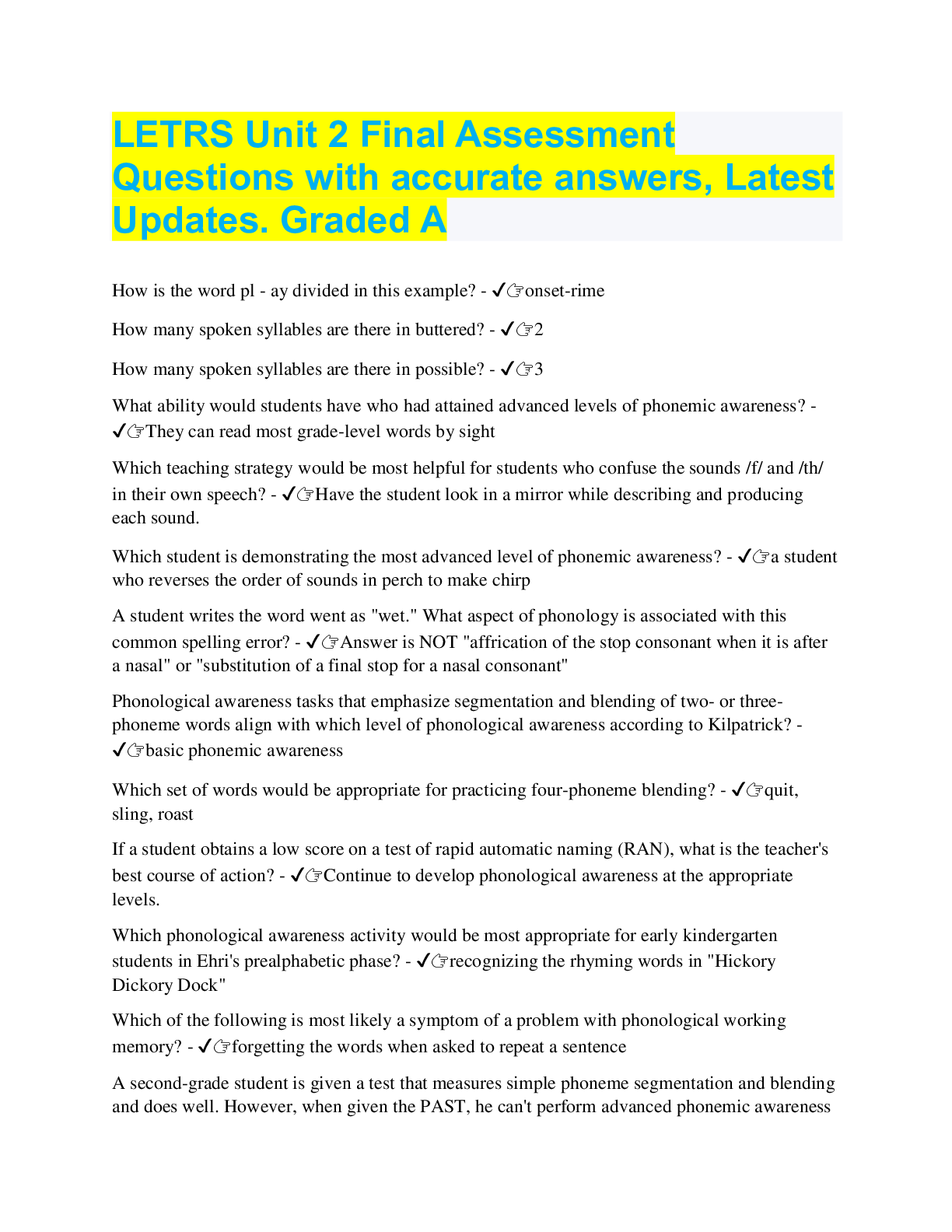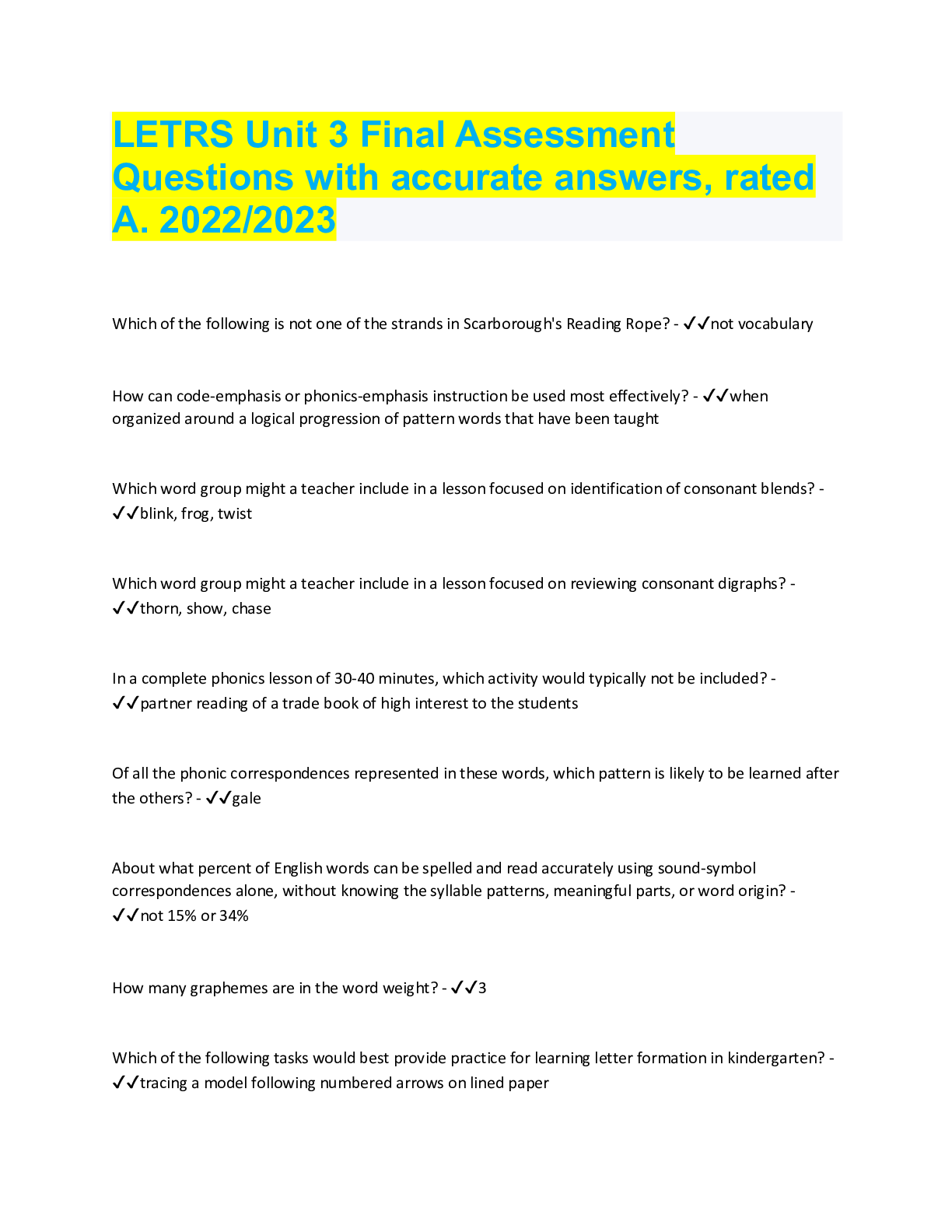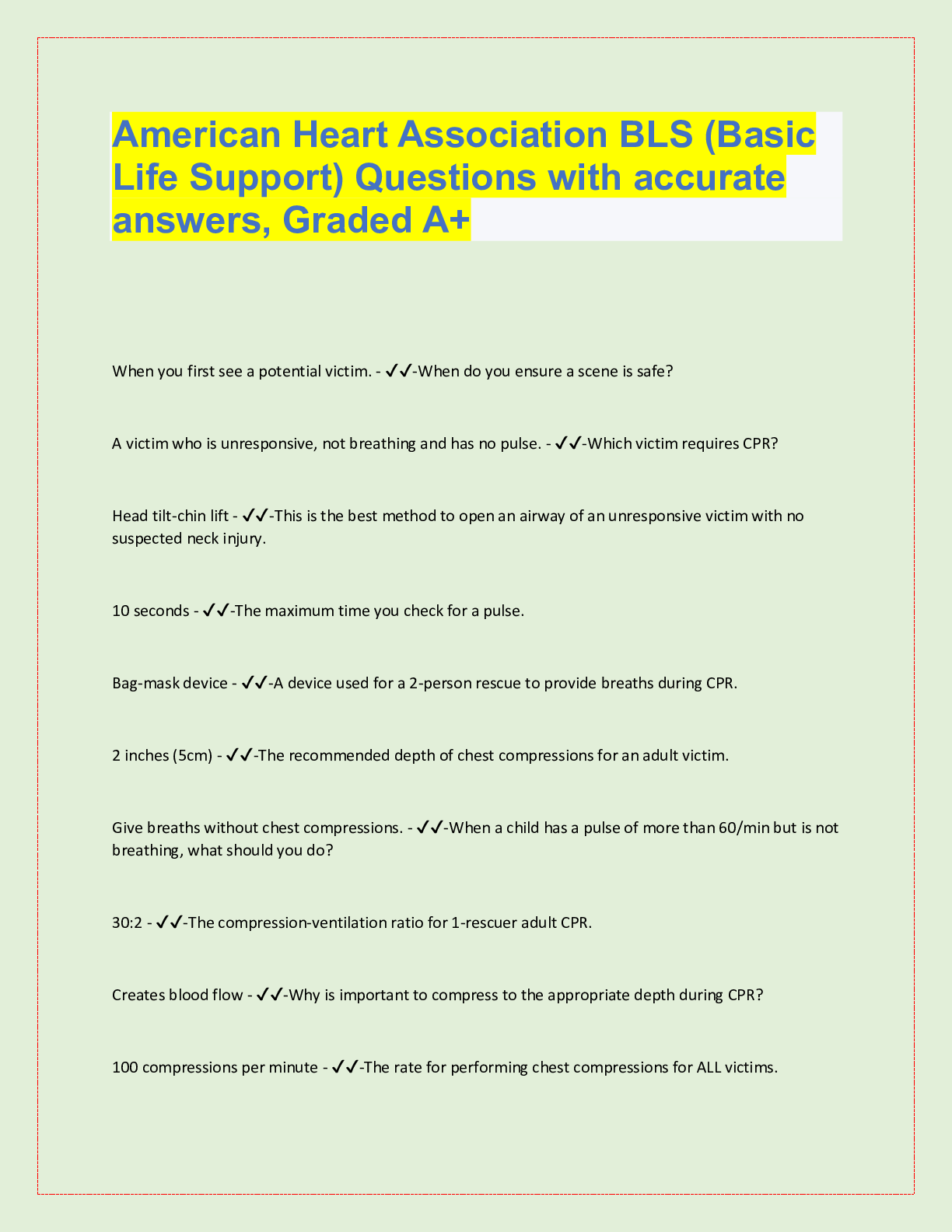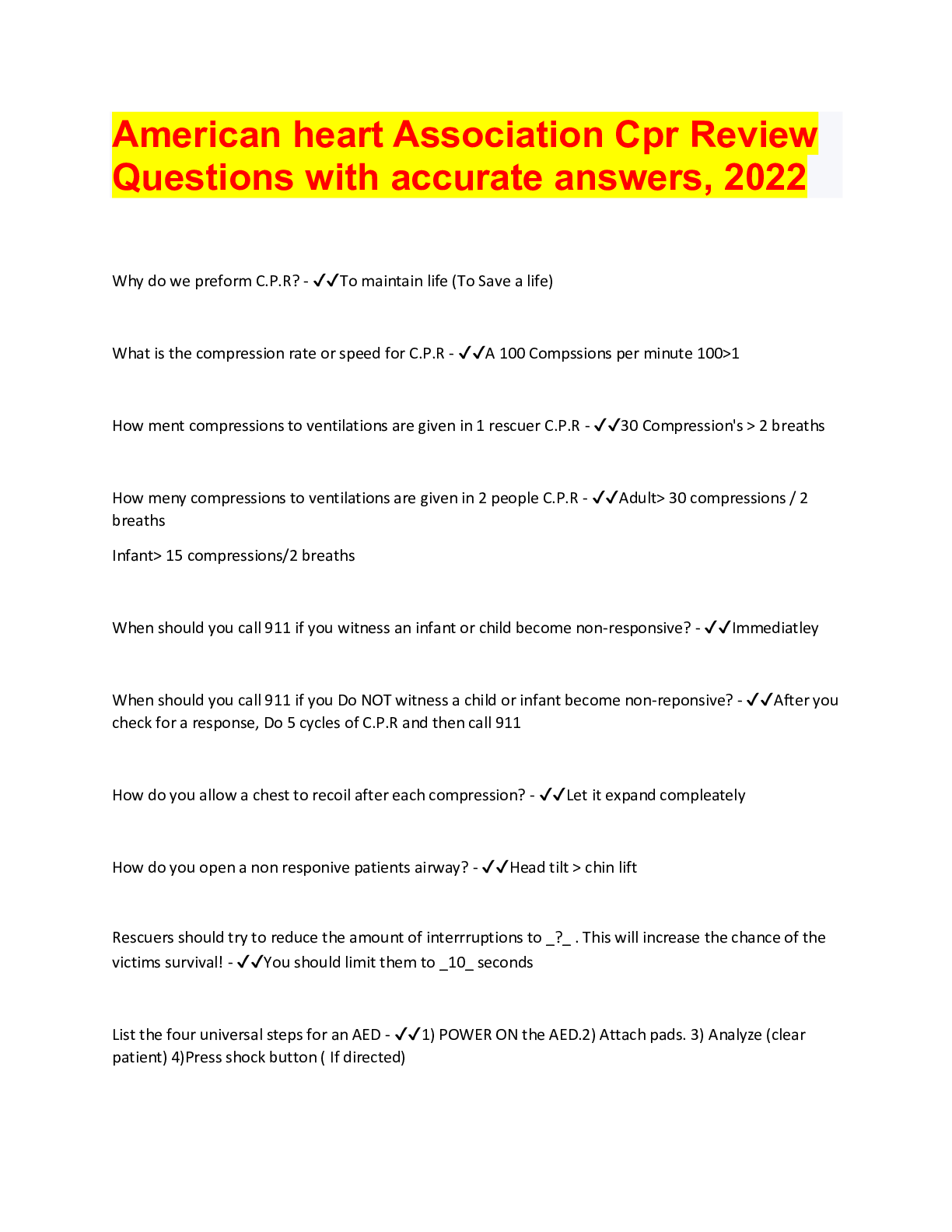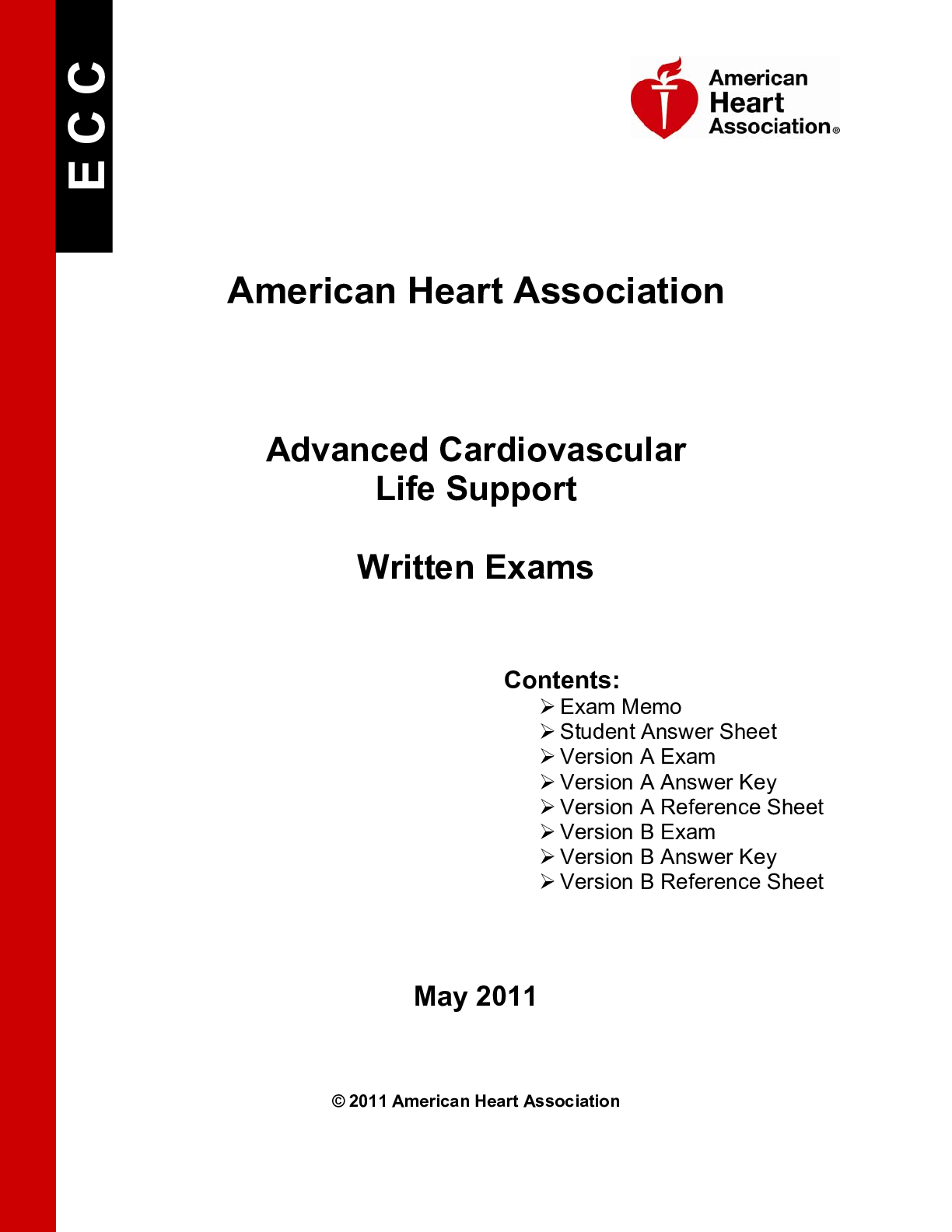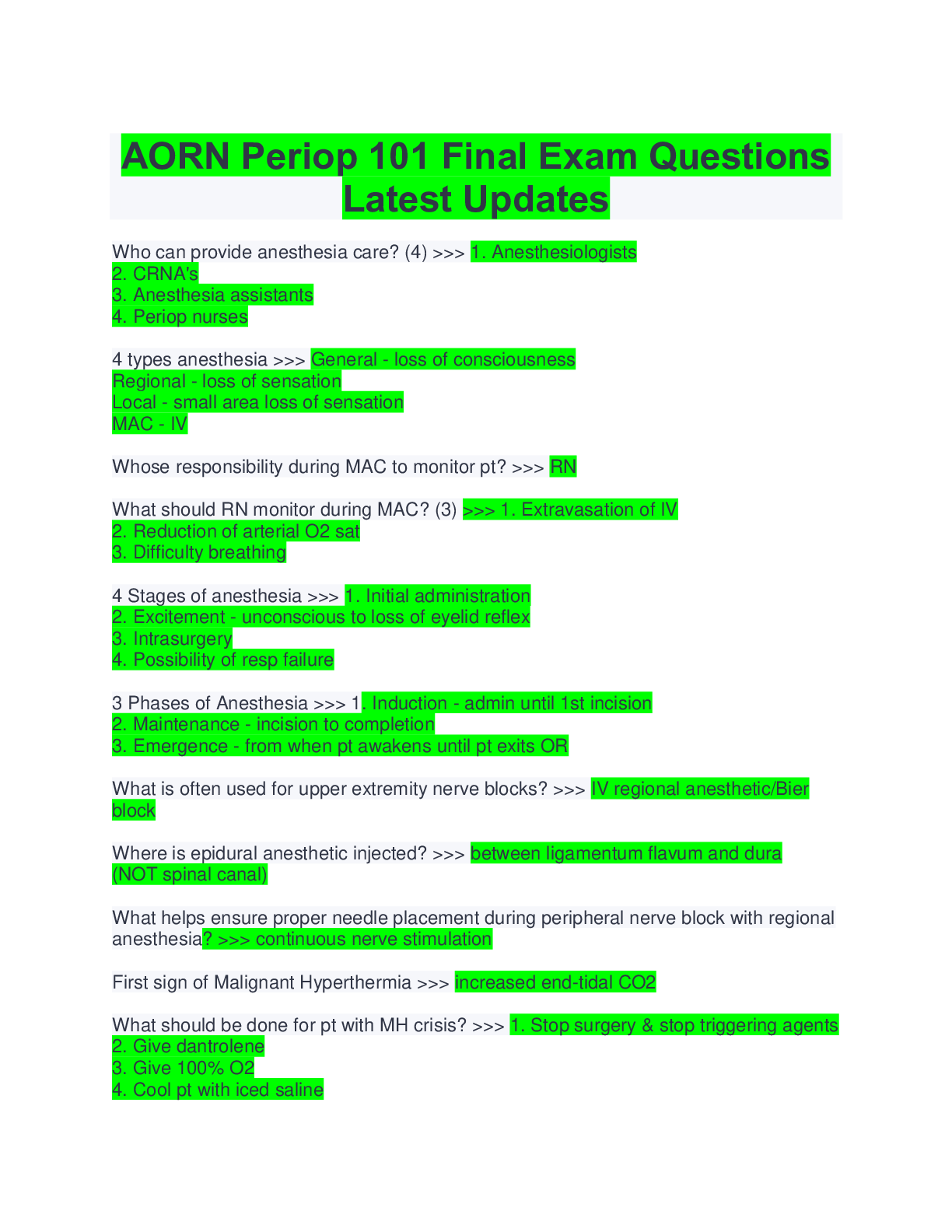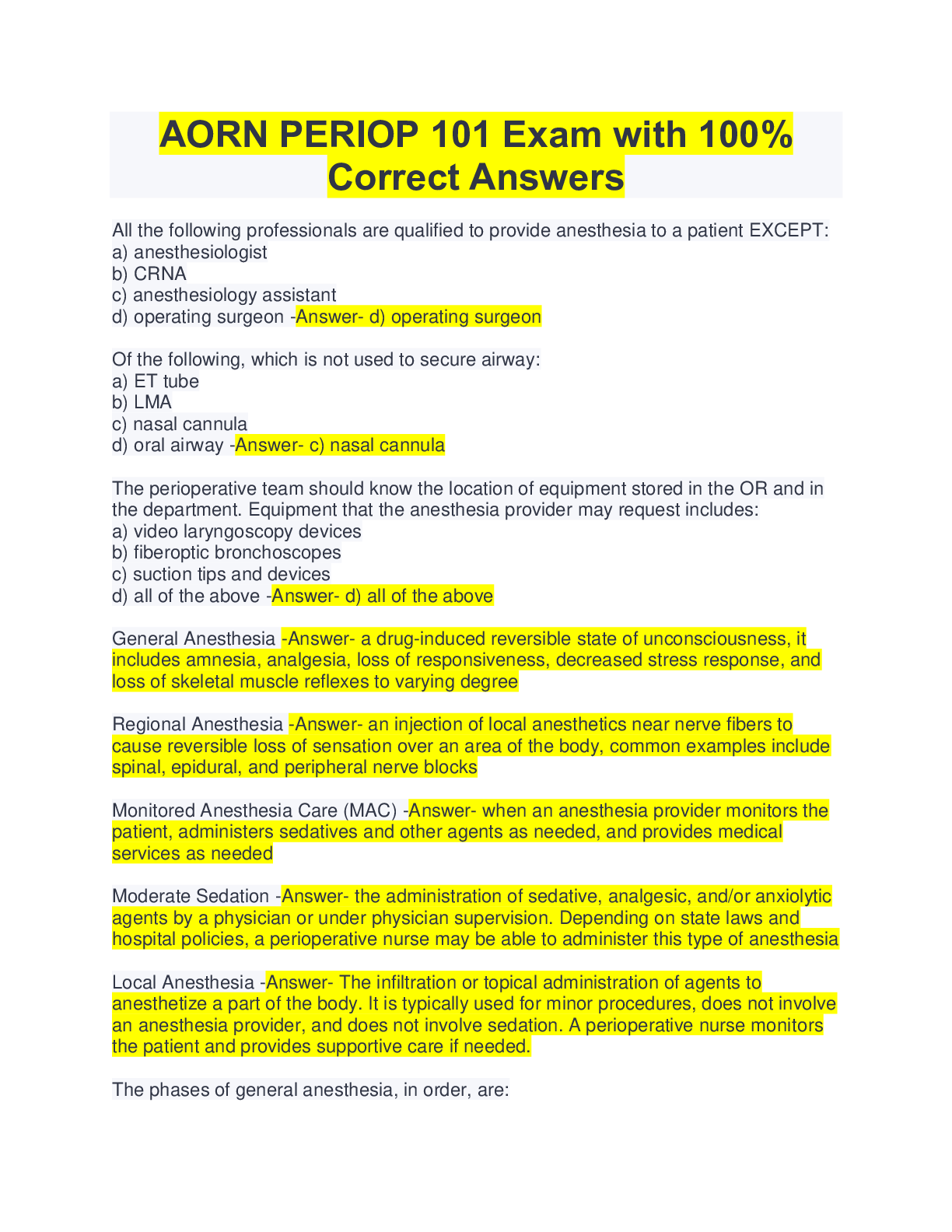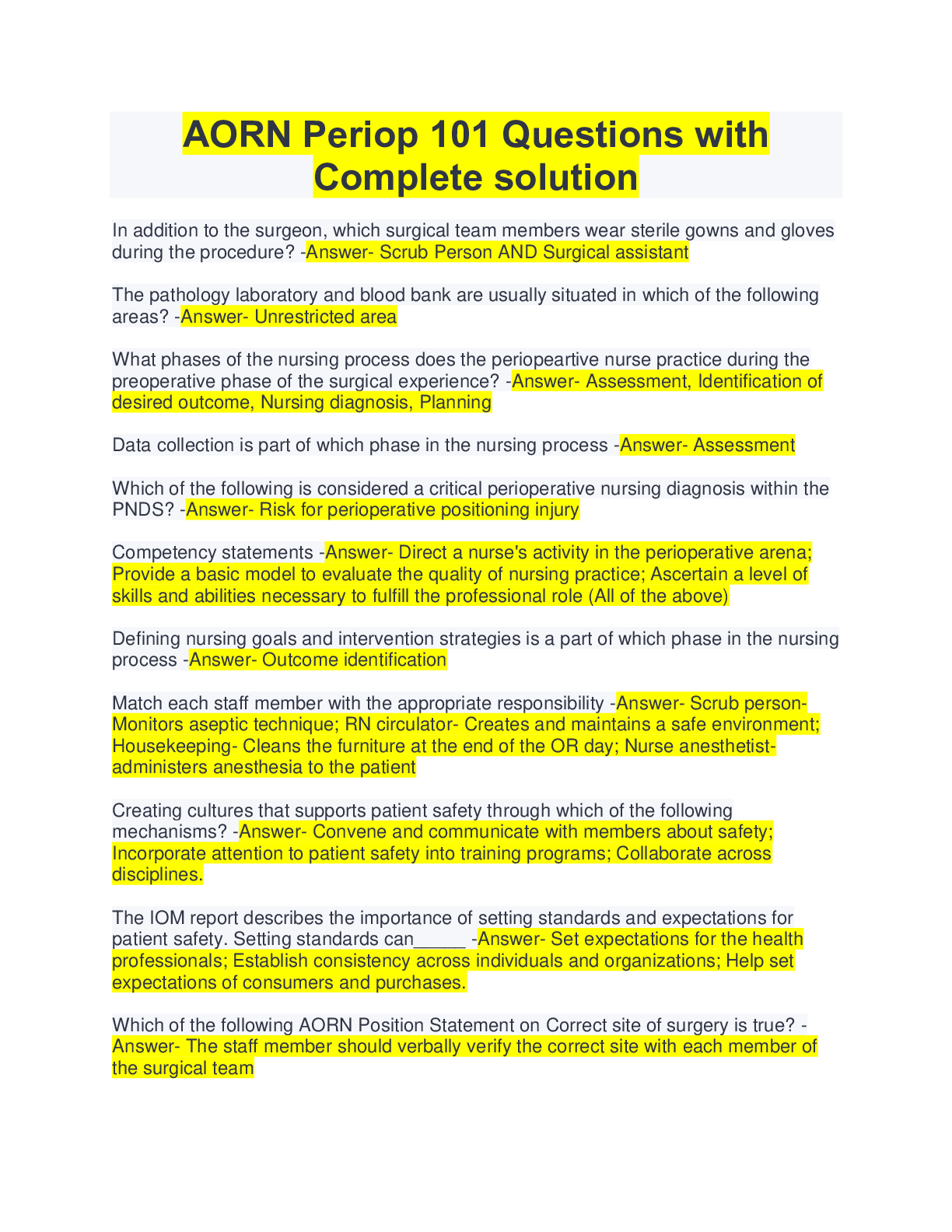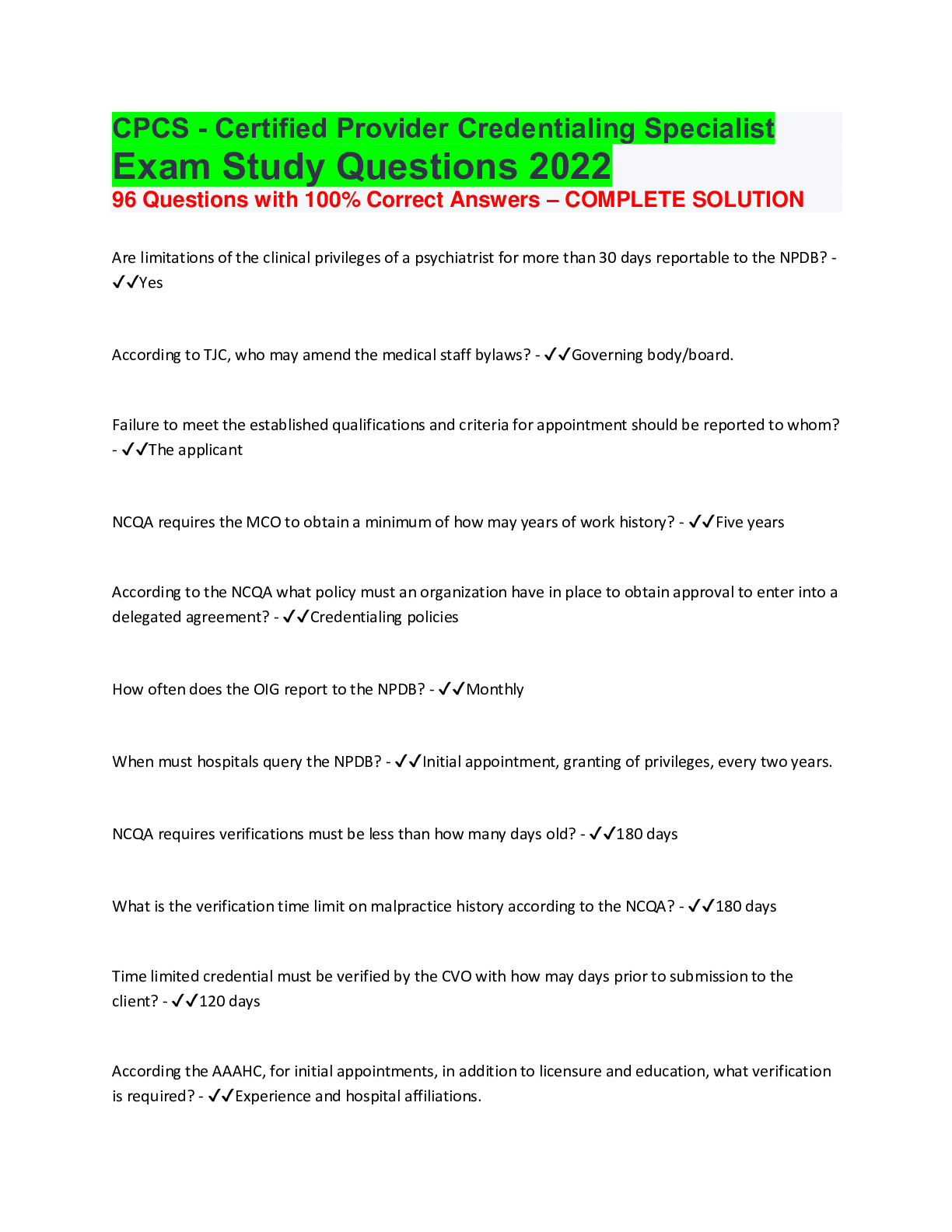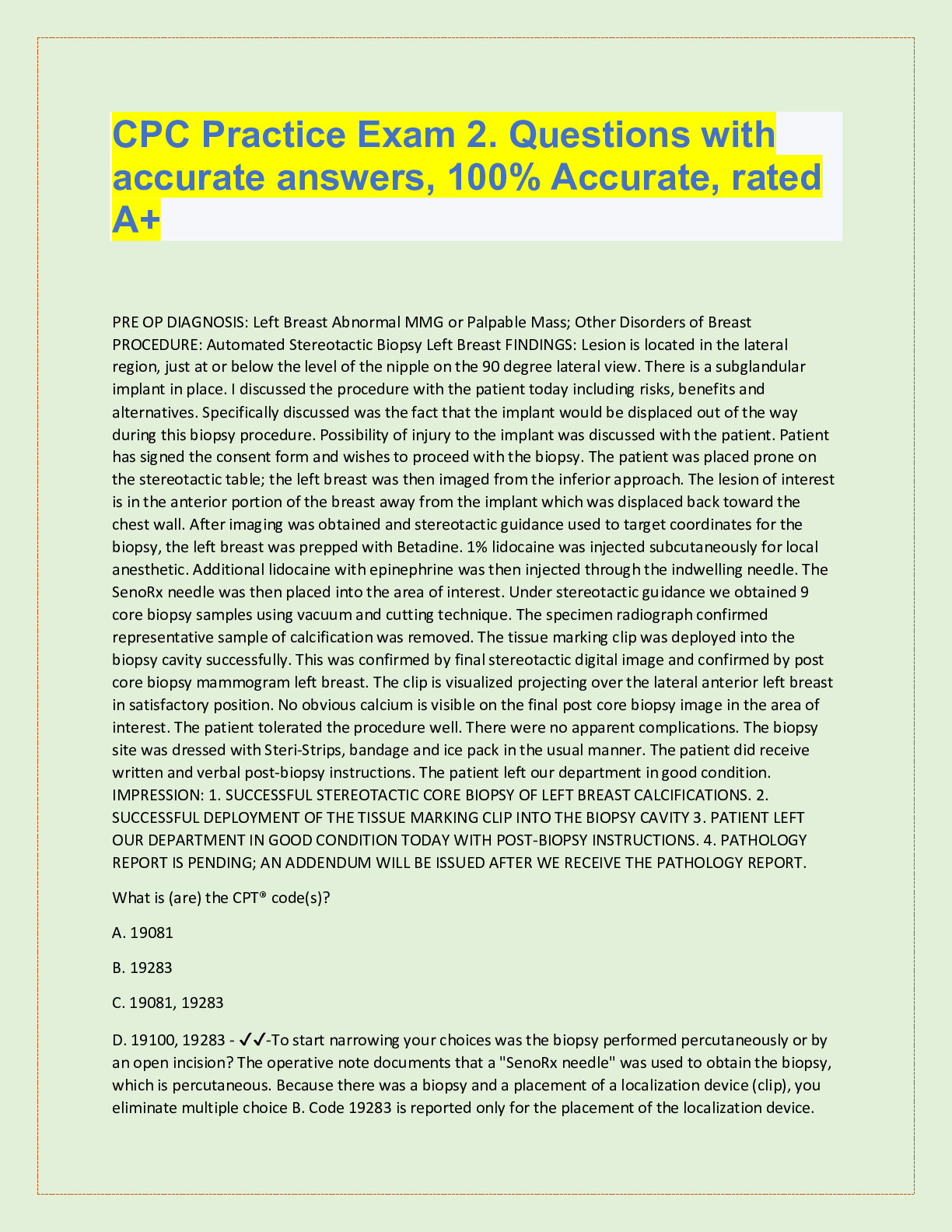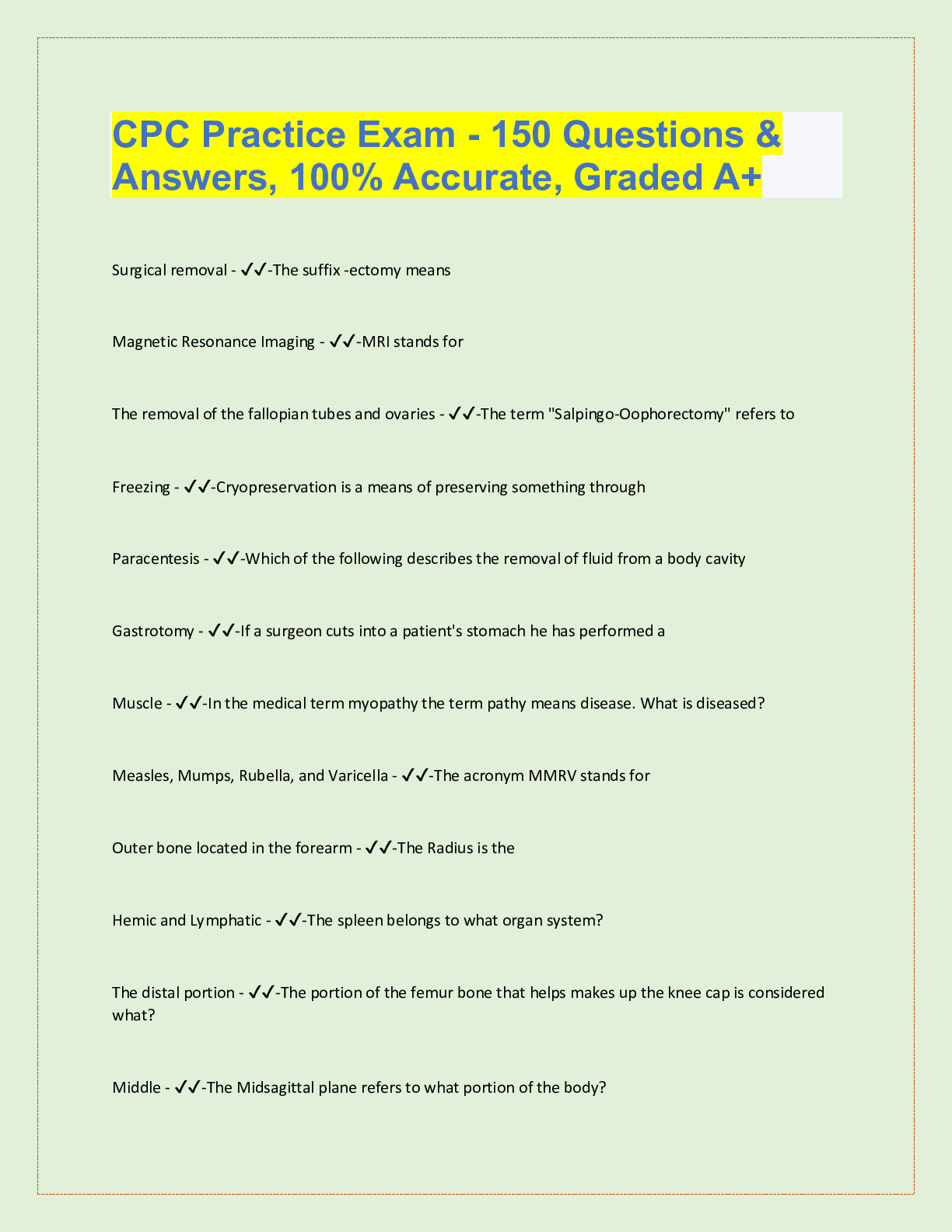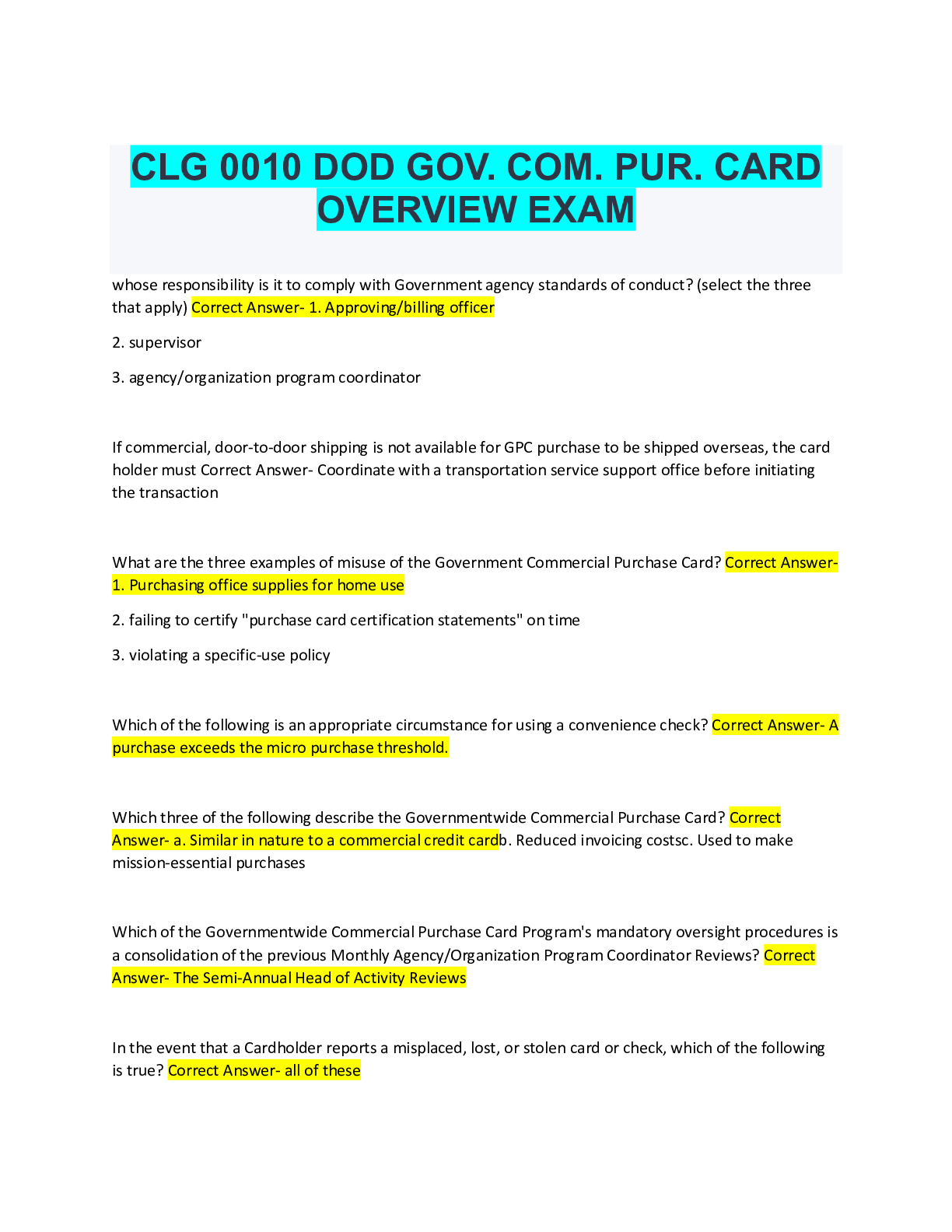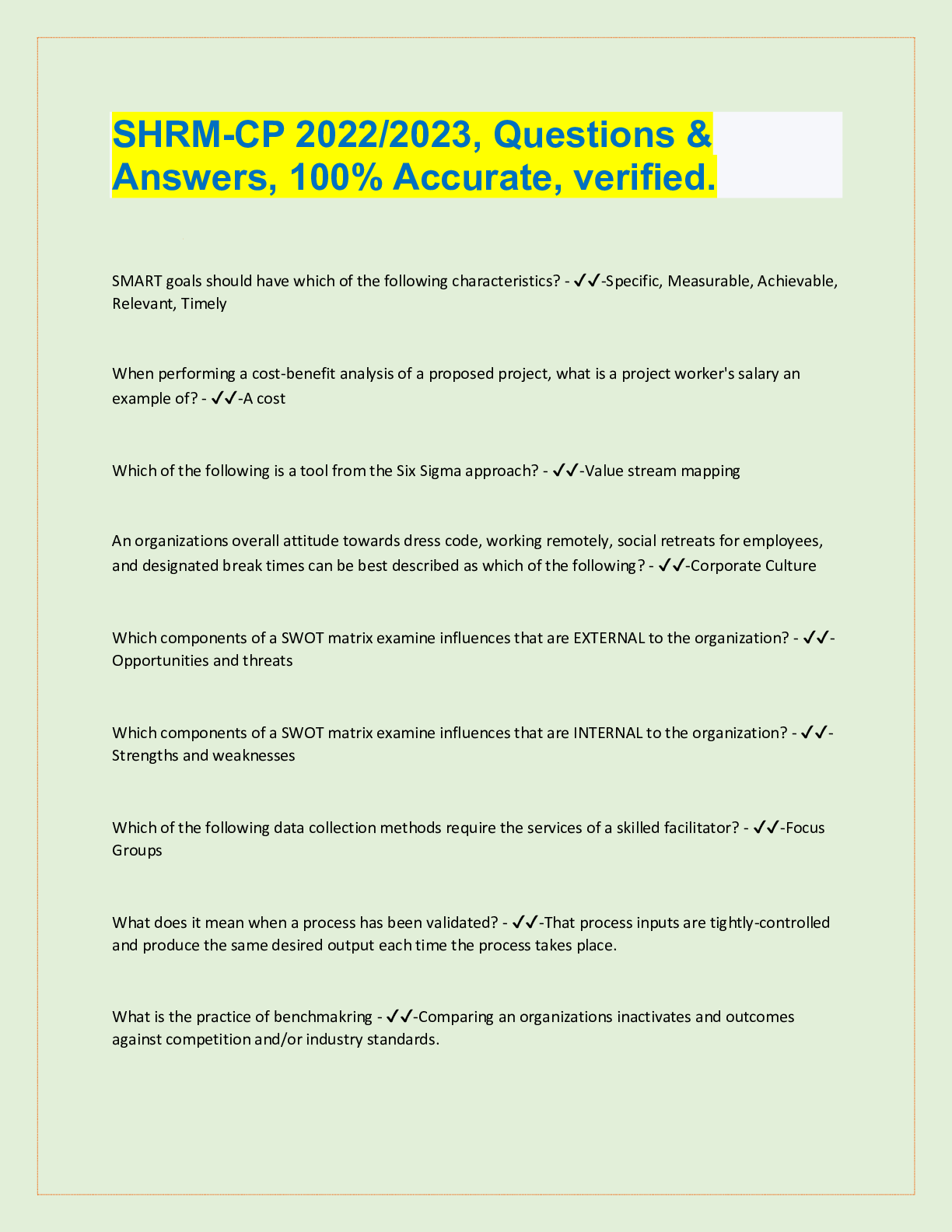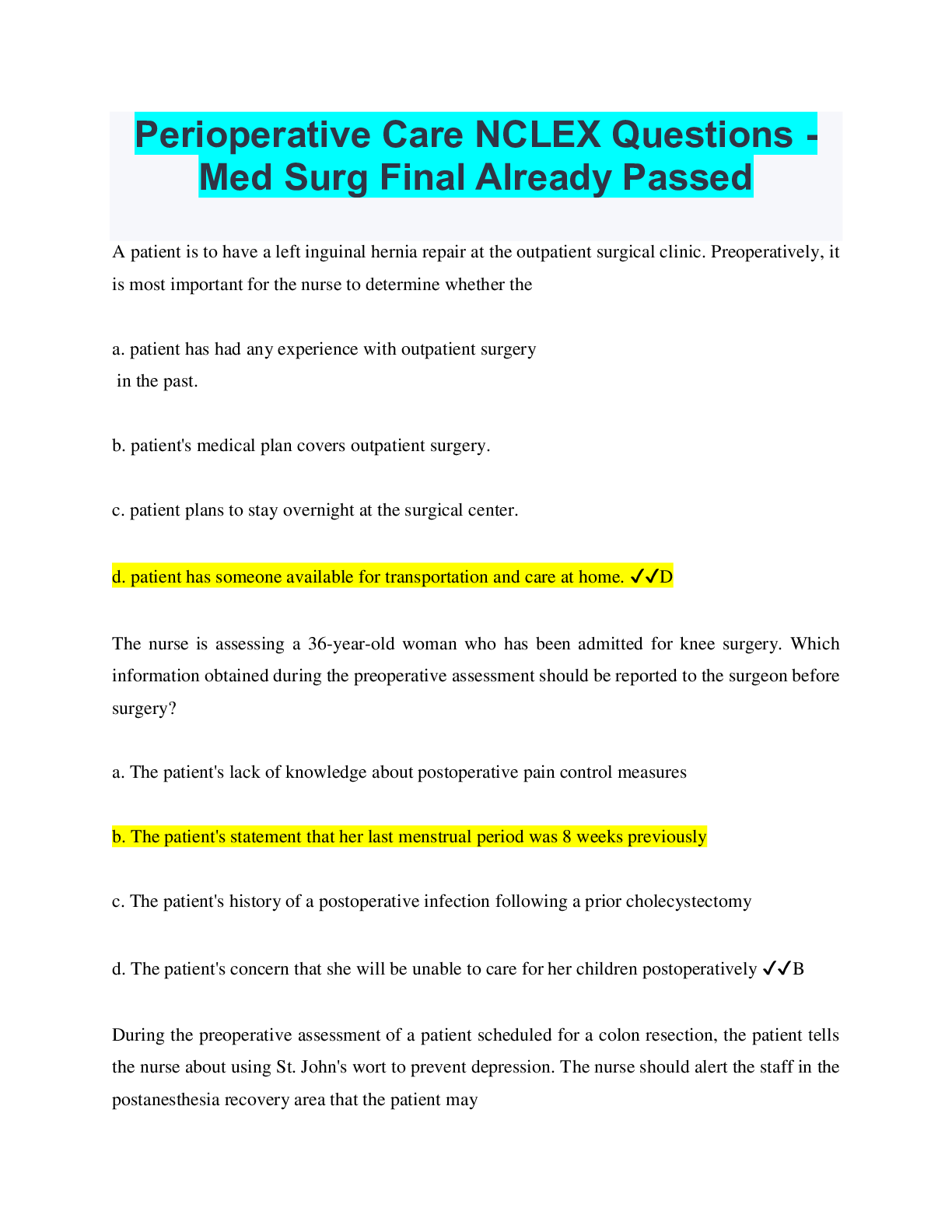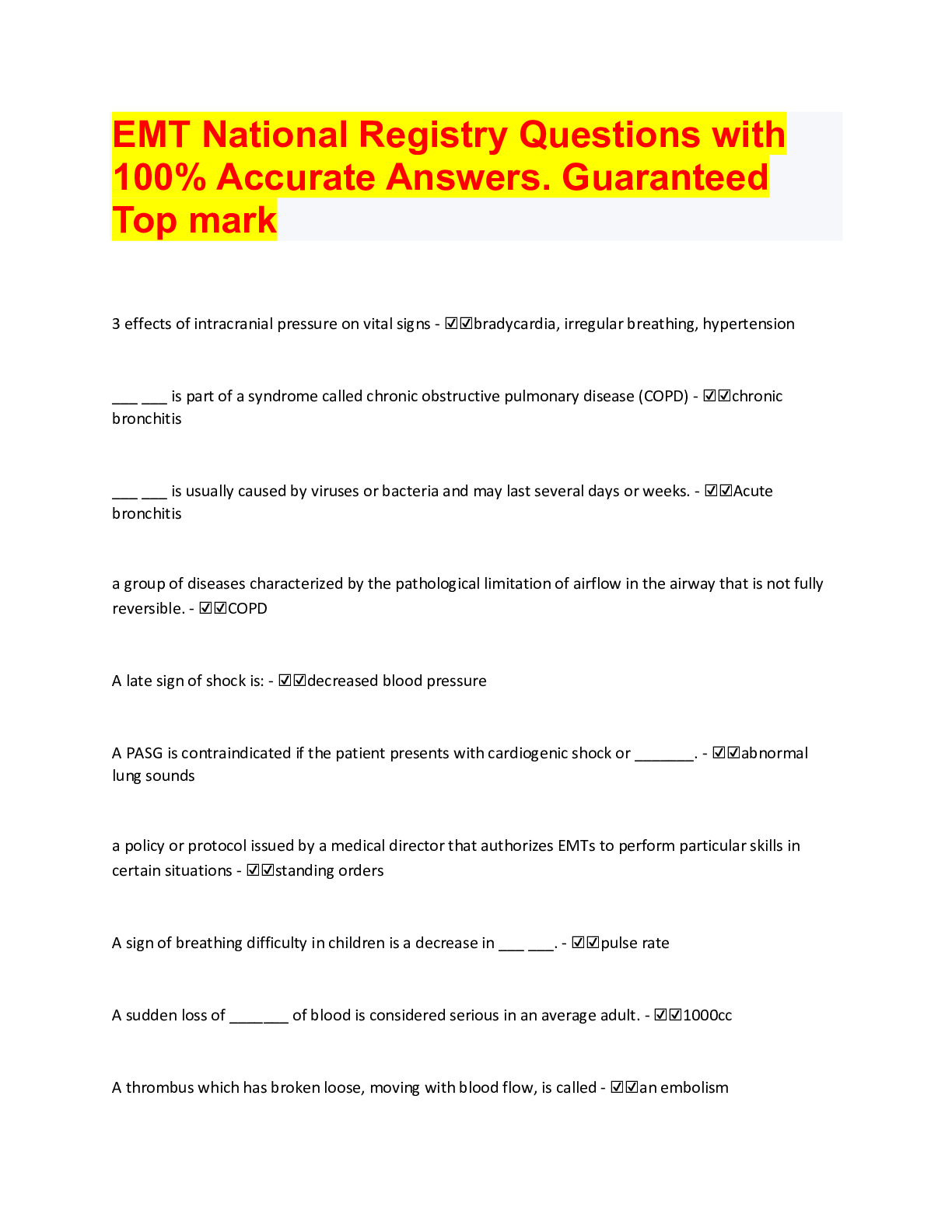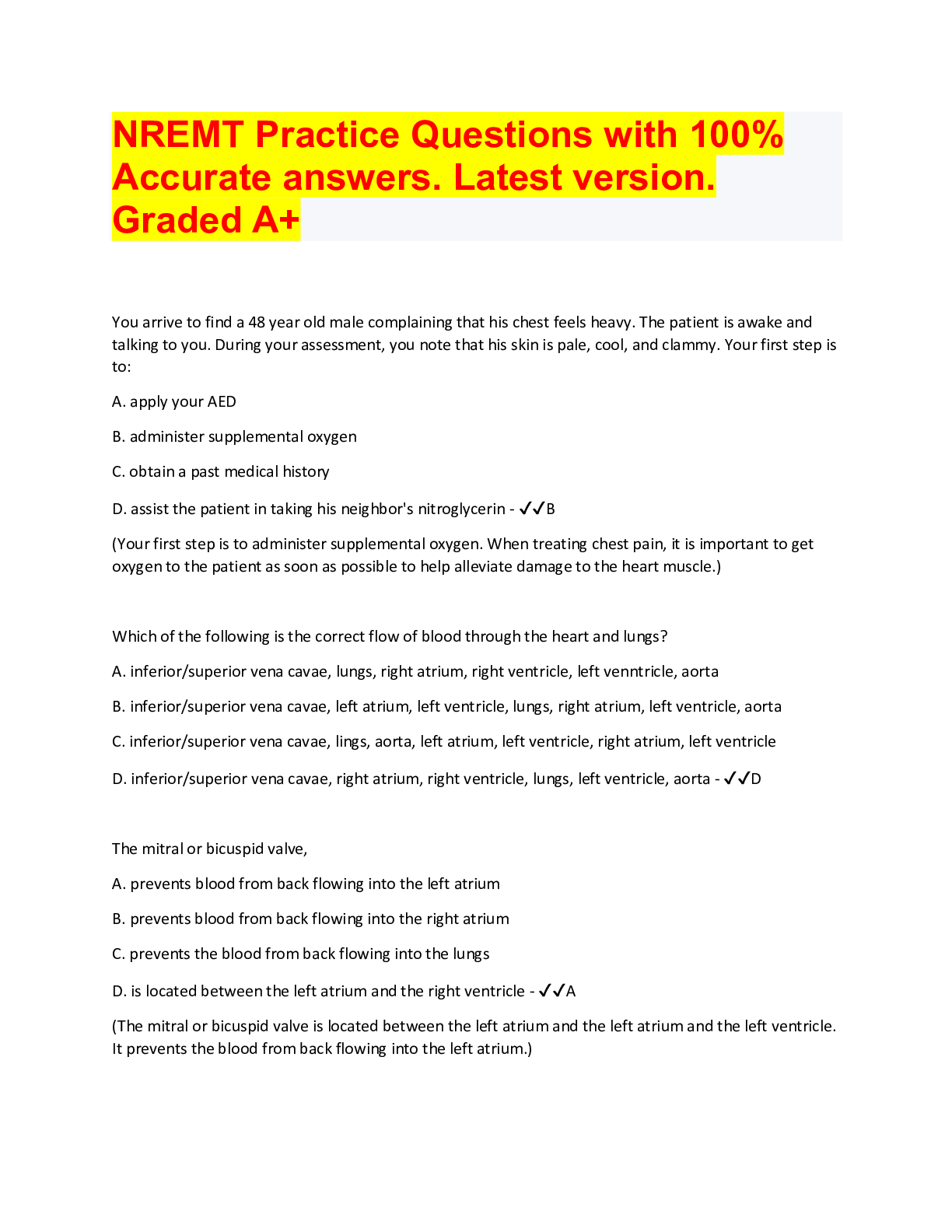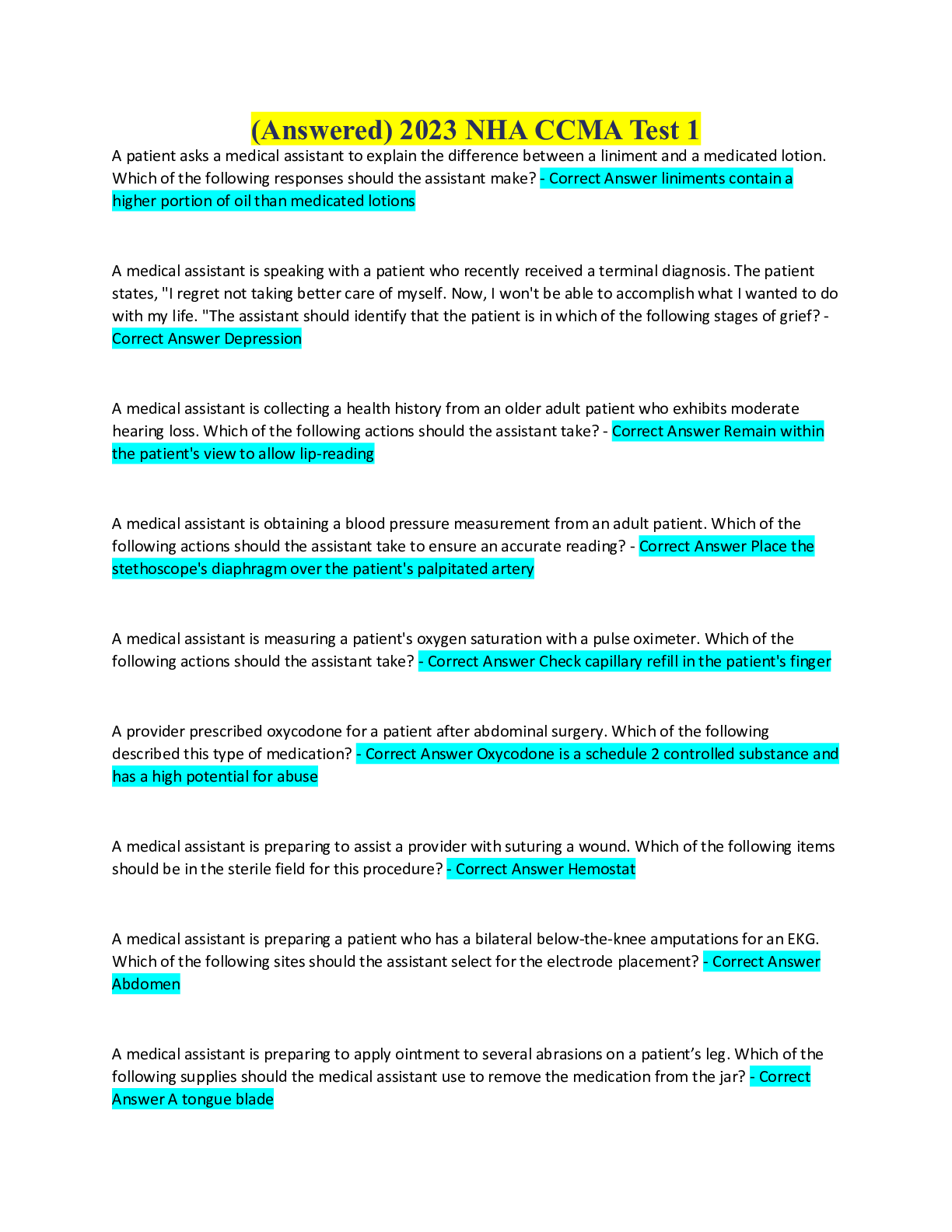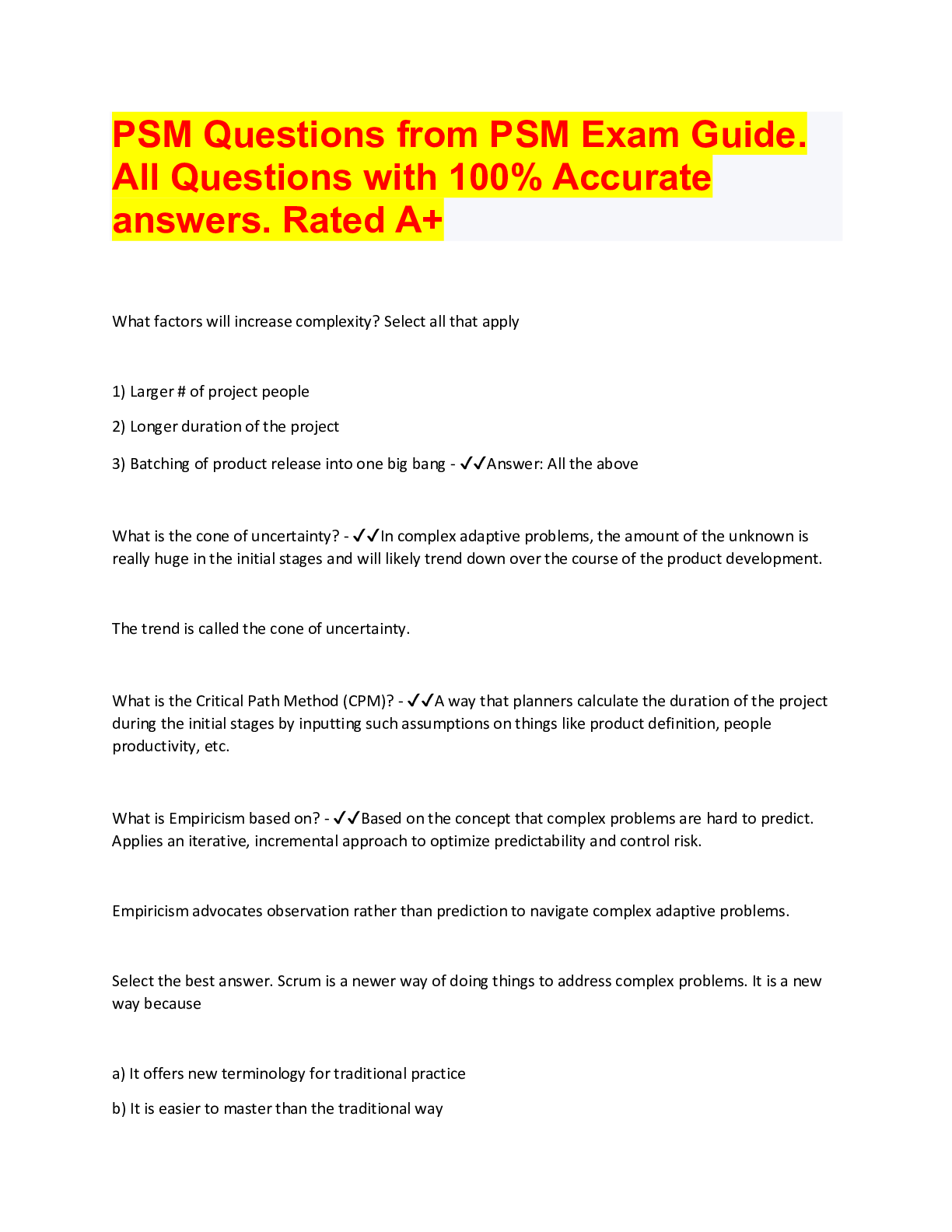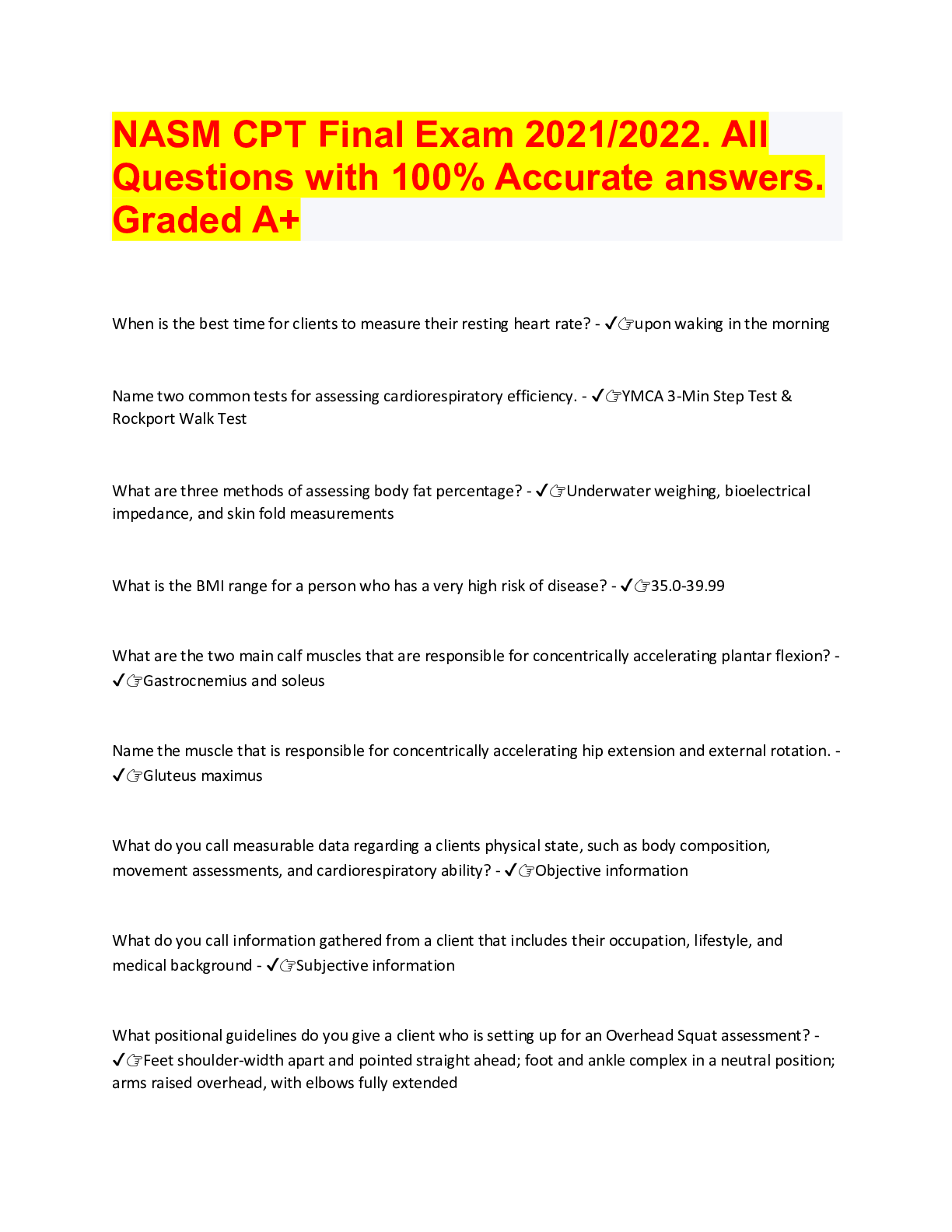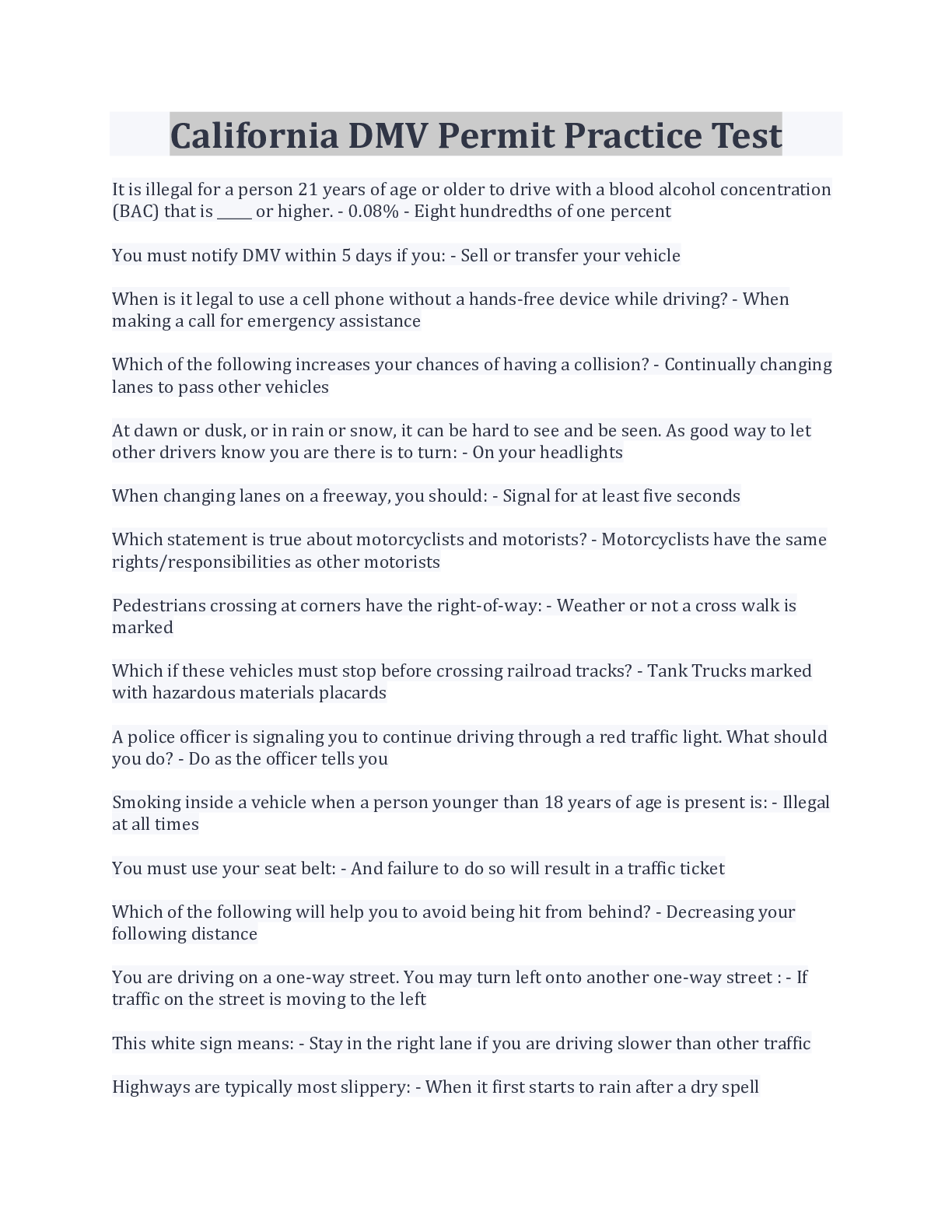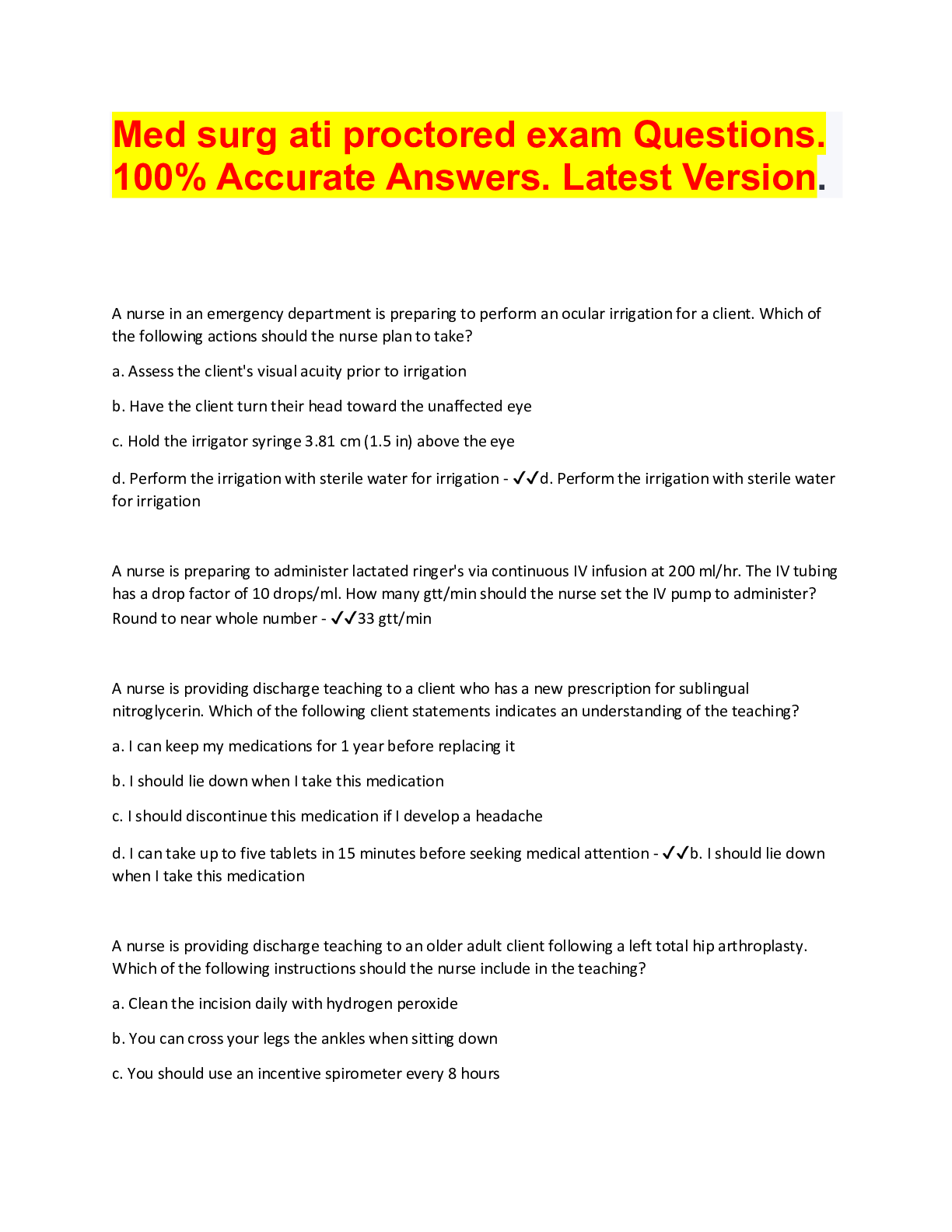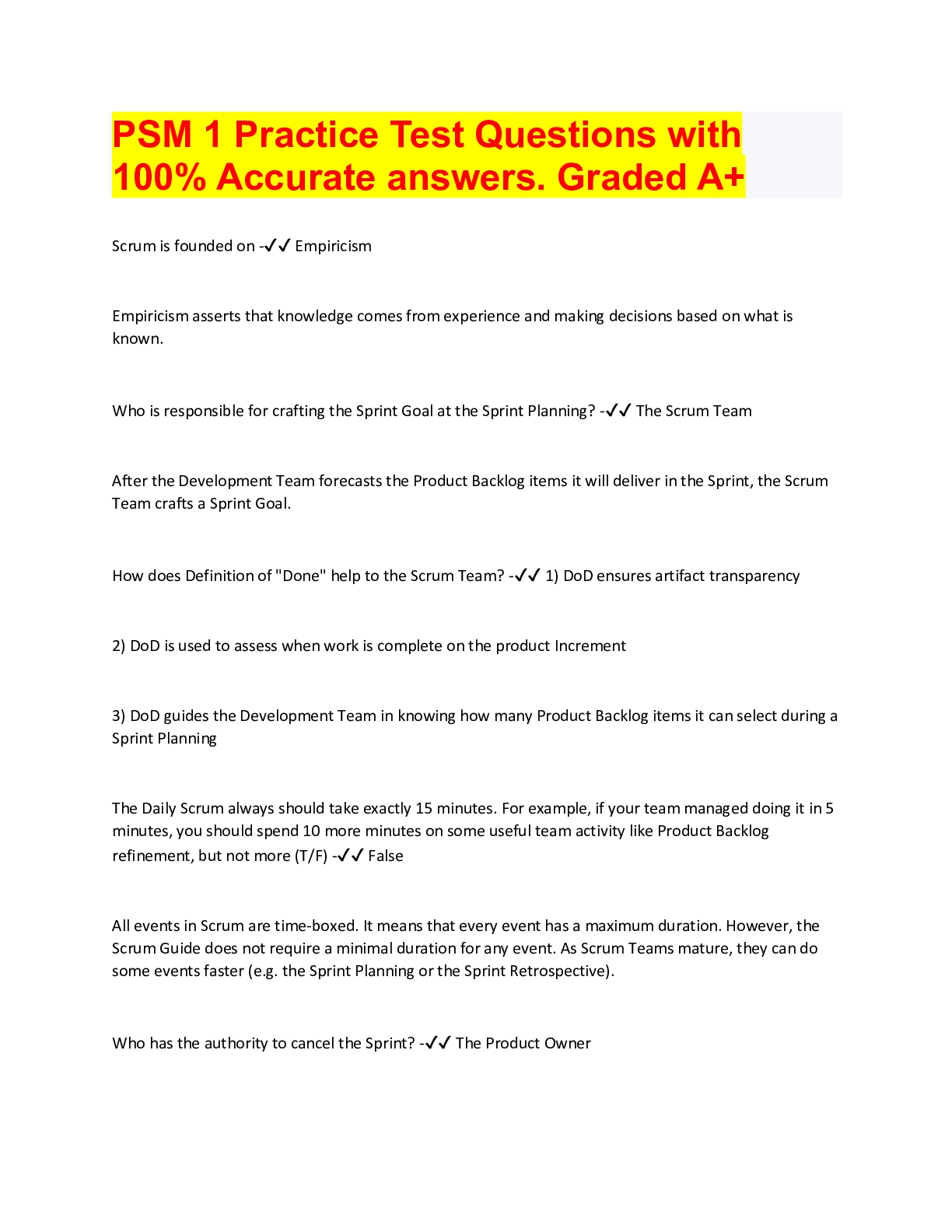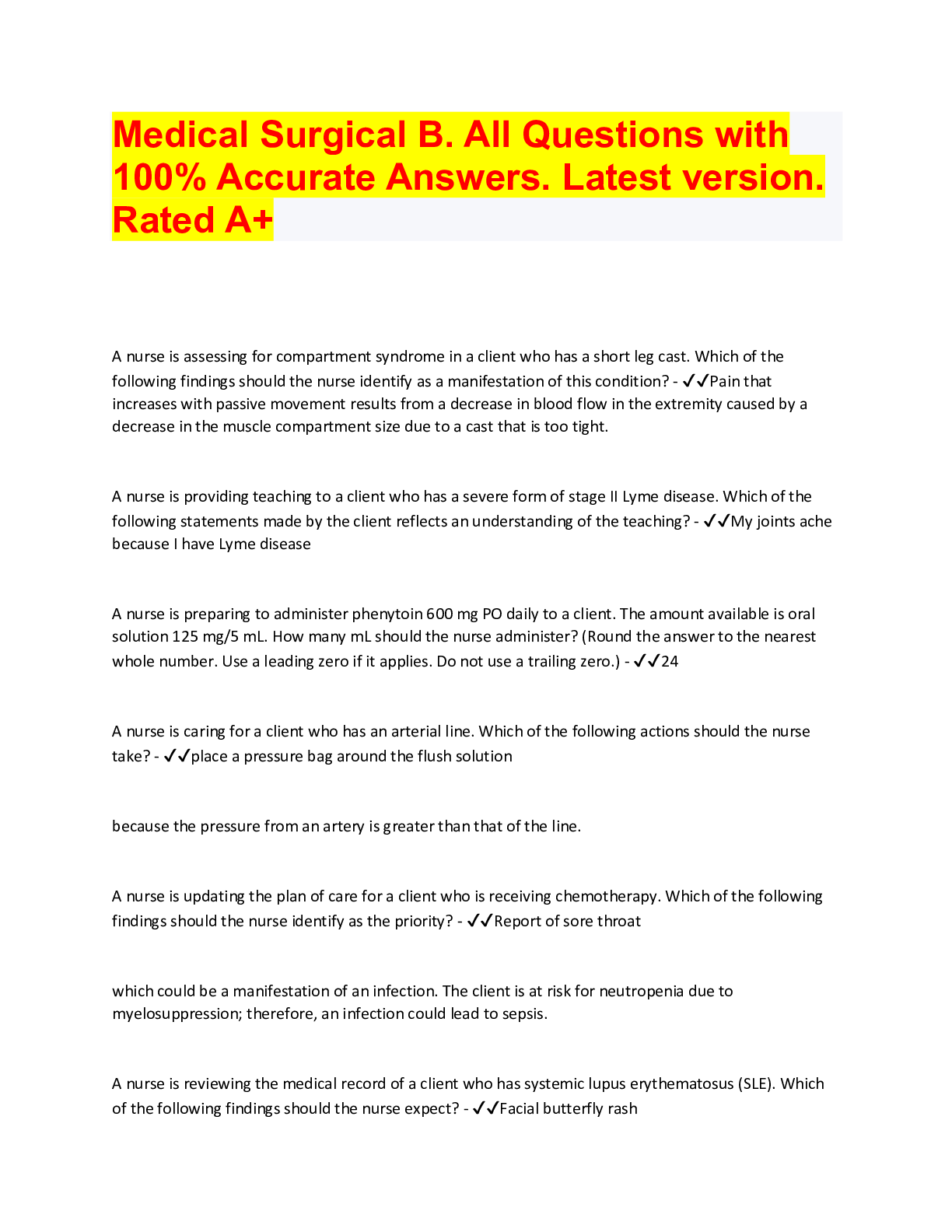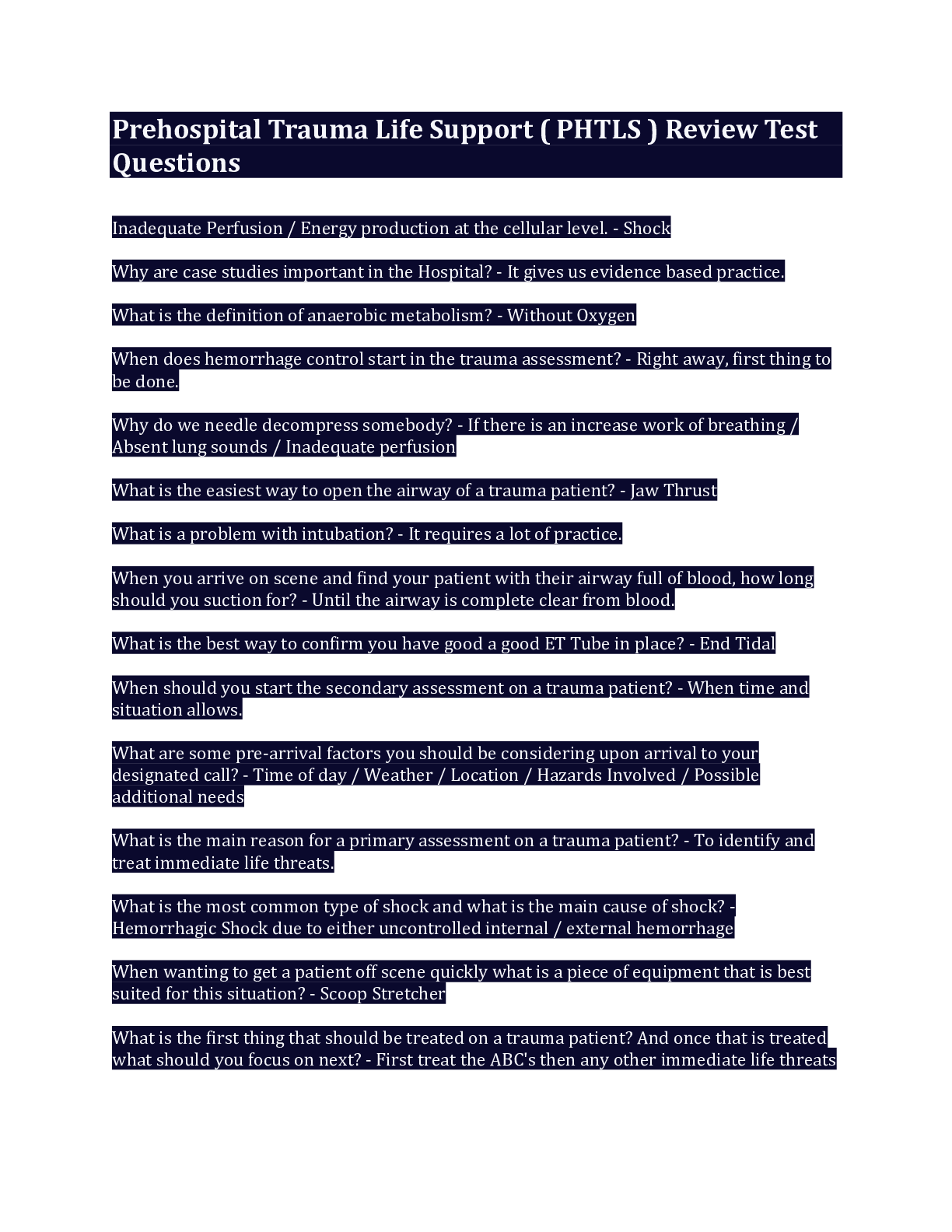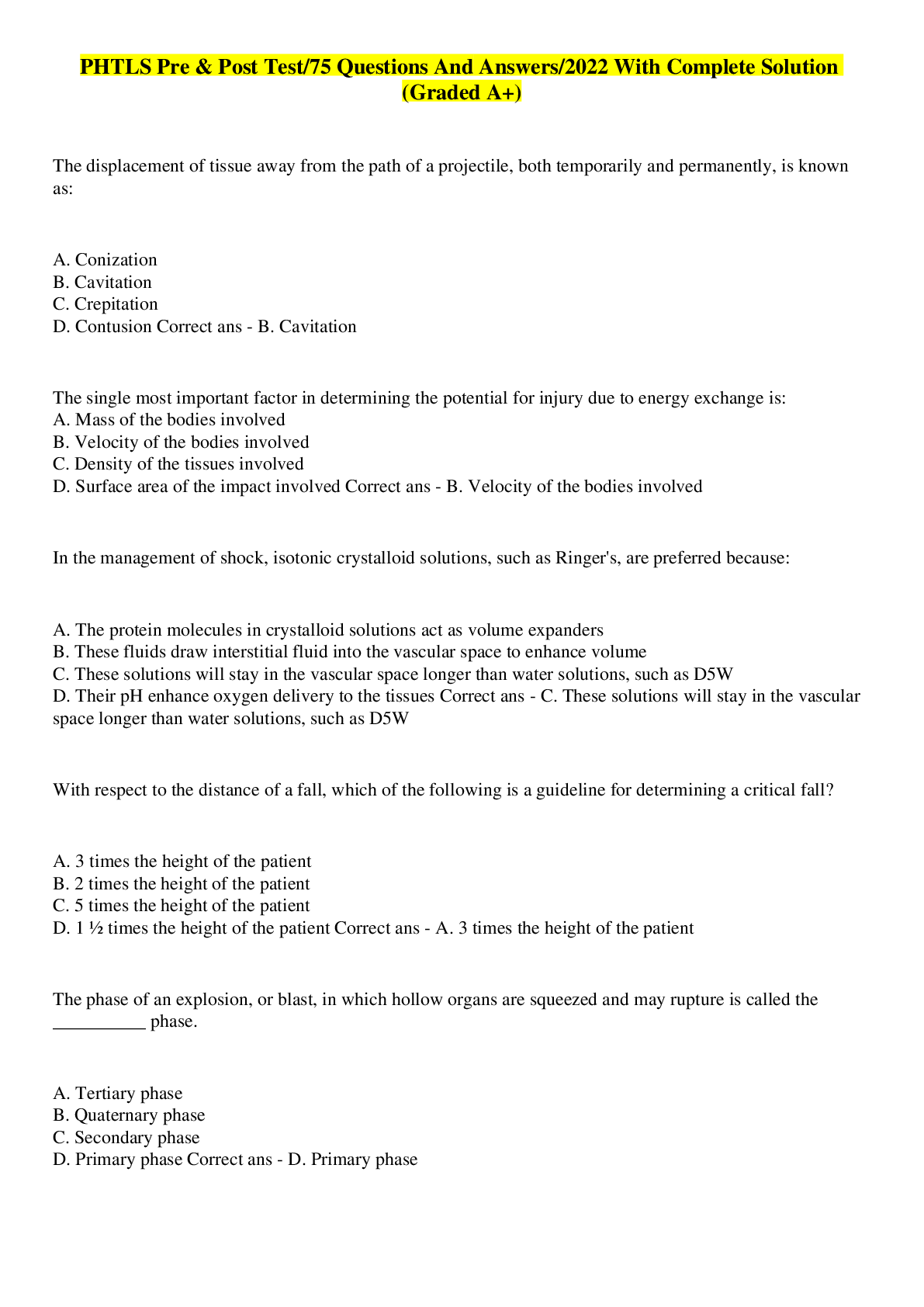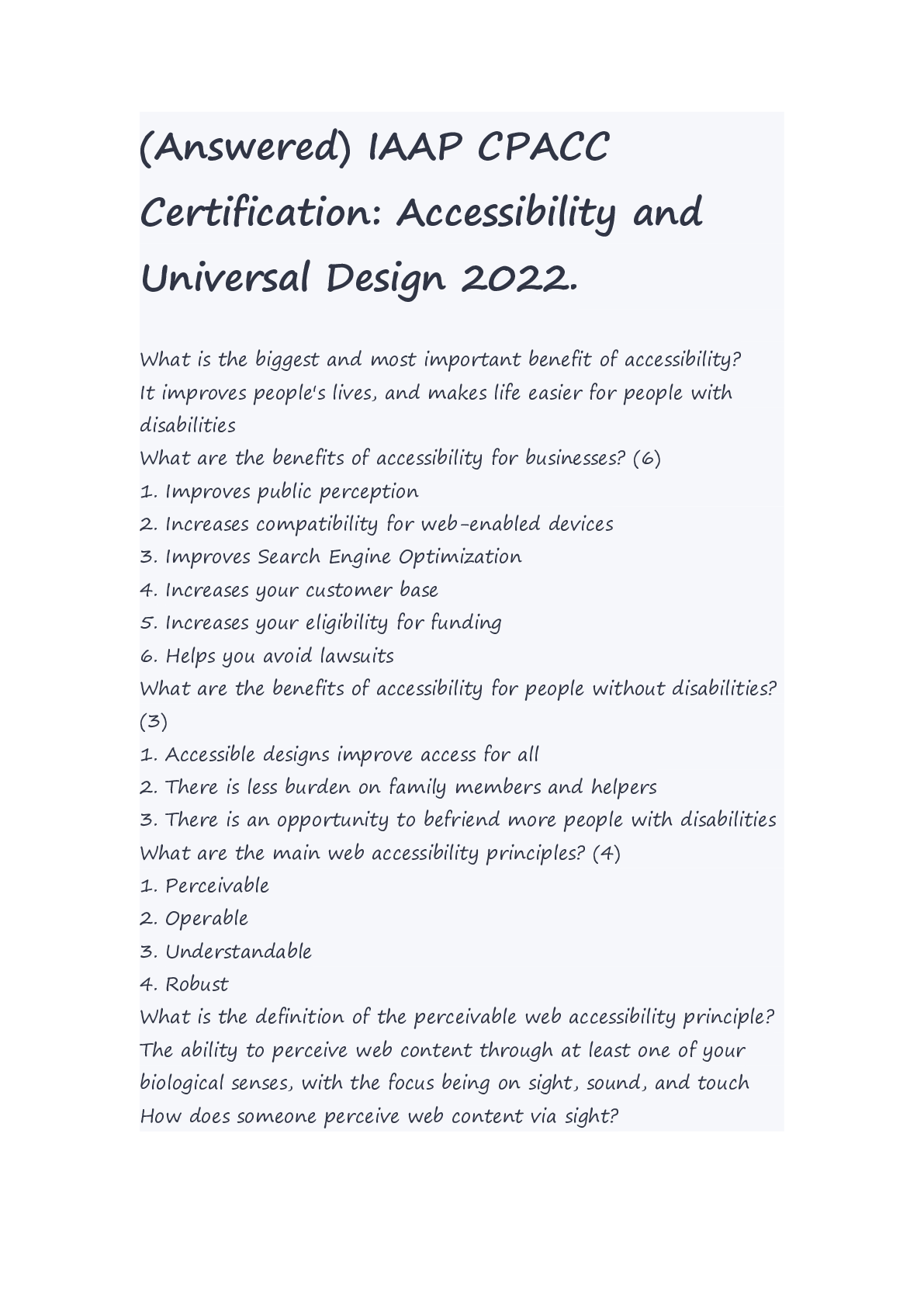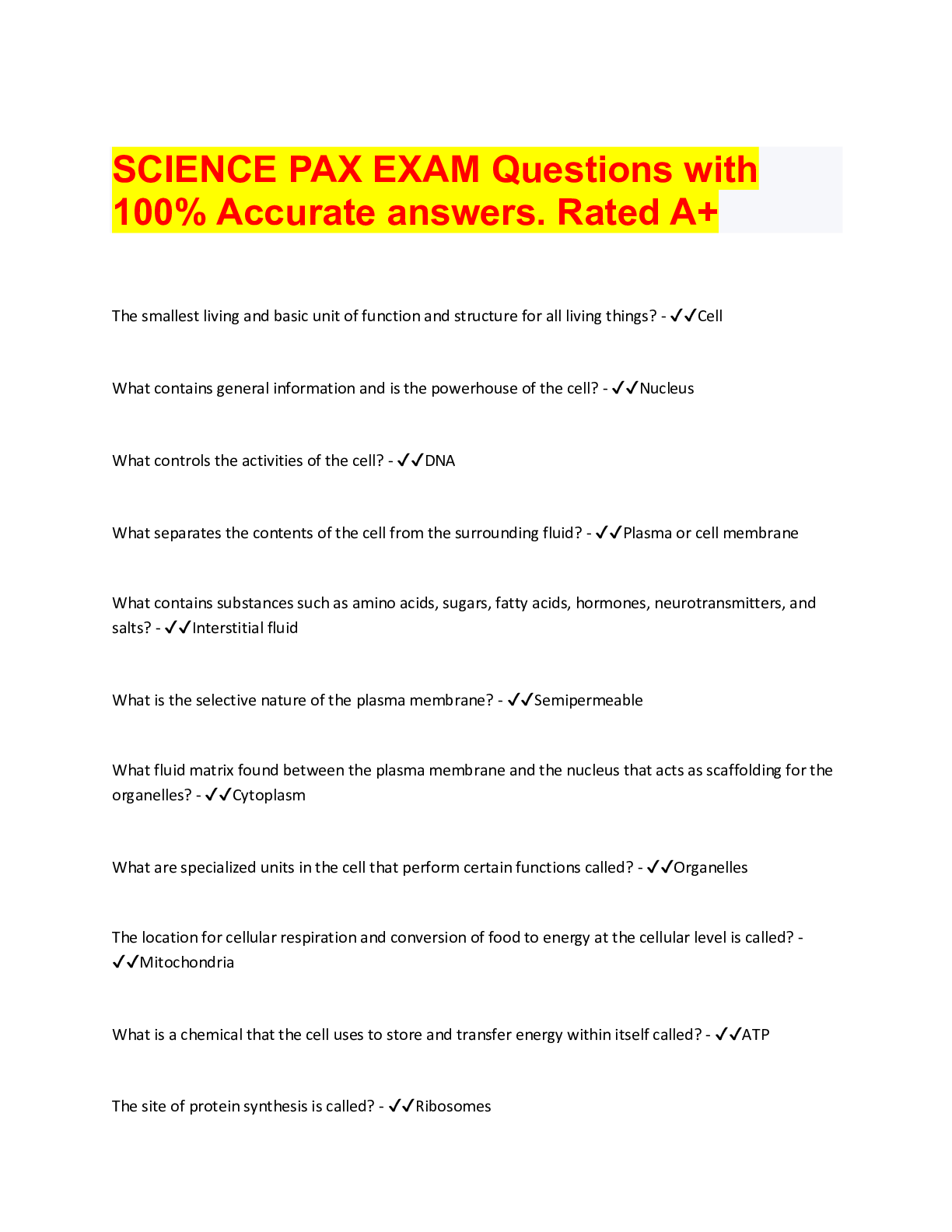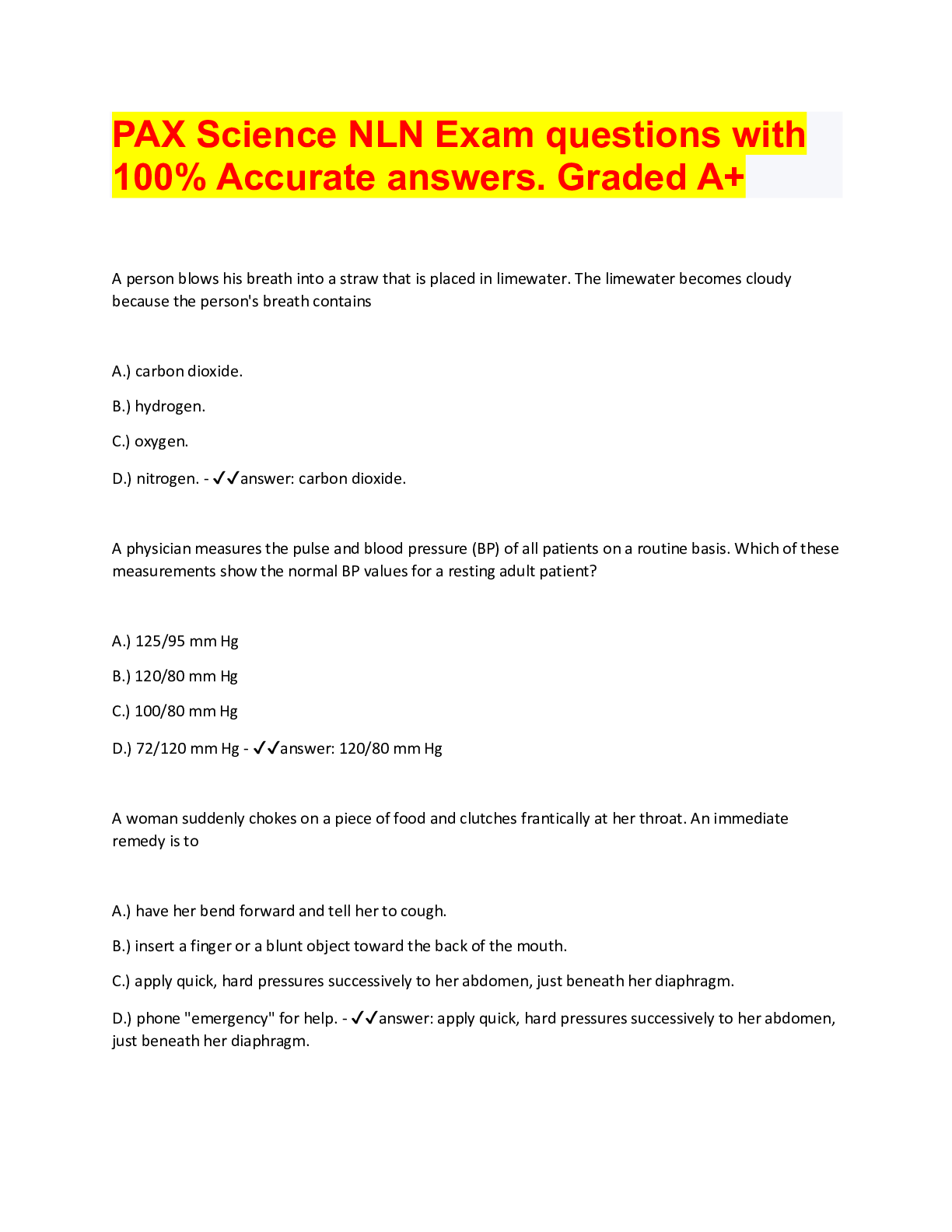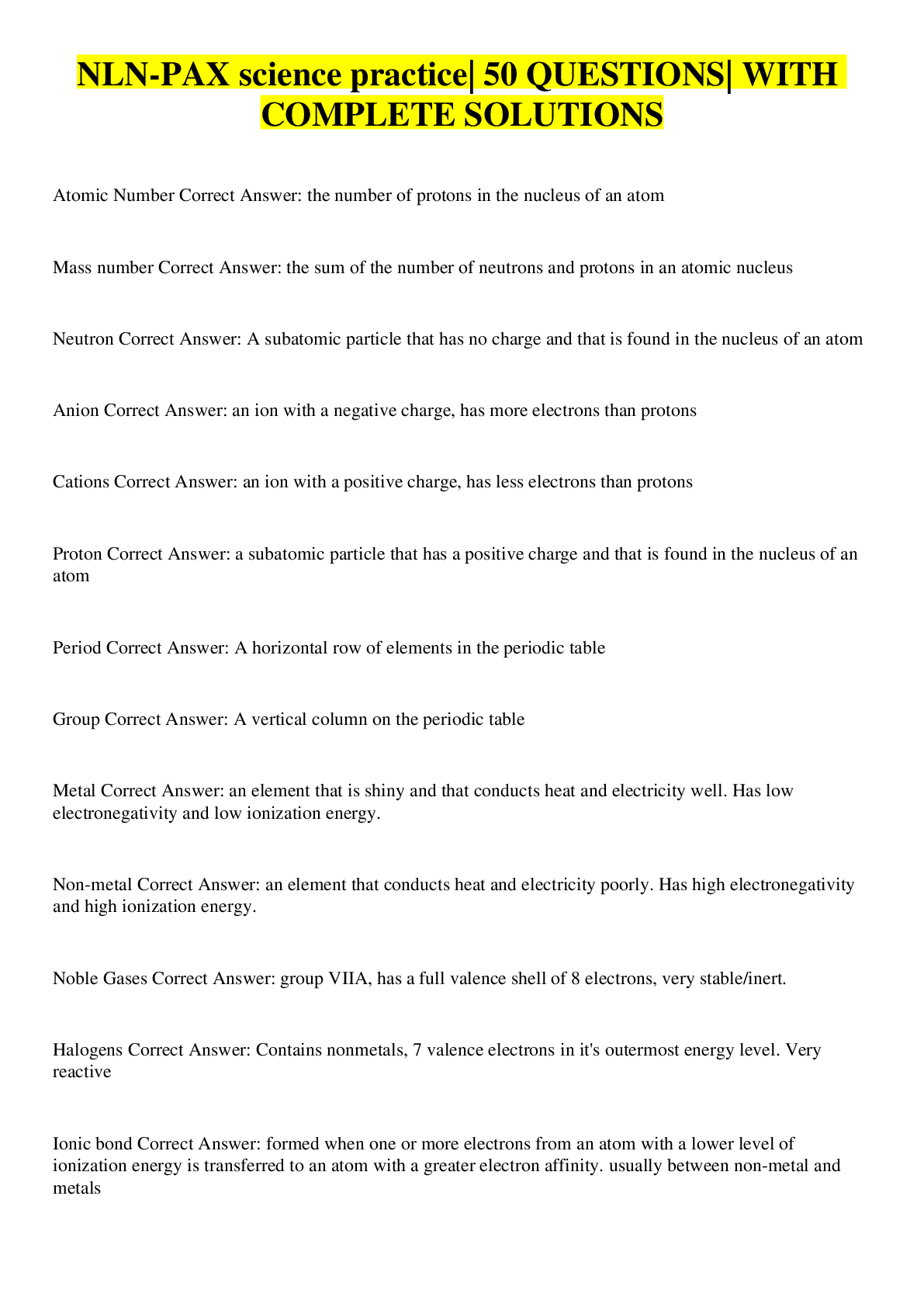*NURSING > QUESTIONS & ANSWERS > NR 293 Exam 1 - All chapters test bank. Questions with 100% Accurate answers. Rated A+ (All)
NR 293 Exam 1 - All chapters test bank. Questions with 100% Accurate answers. Rated A+
Document Content and Description Below
A patient must be treated immediately for acute organ transplant rejection. The nurse anticipates that muromonab-CD3 (Orthoclone OKT3) will be ordered. What is the priority assessment before beginni... ng drug therapy with muromonab-CD3? a. Serum potassium level b. Fluid volume status c. Electrocardiogram d. Blood glucose level - ✔✔ANS: B Assess fluid volume status because muromonab-CD3 is contraindicated in the presence of fluid overload. The other options are incorrect. DIF: COGNITIVE LEVEL: Applying (Application) REF: p. 777 TOP: NURSING PROCESS: Assessment 2. A patient is about to undergo a kidney transplant. She will be given an immunosuppressant drug before, during, and after surgery to minimize organ rejection. During the preoperative teaching session, which information will the nurse include about the medication therapy? a. Several days before the surgery, the medication will be administered orally. b. The oral doses need to be taken 1 hour before meals to maximize absorption. c. Mix the oral liquid with juice in a disposable Styrofoam cup just before administration. d. Intramuscular injections of the medication will be needed for several days preceding surgery. - ✔✔ANS: A Several days before transplant surgery, immunosuppressant drugs need to be taken by the oral route, if possible, to avoid intramuscular injections and the risk for infection caused by the injections. Avoid Styrofoam containers because the medication may adhere to the side of the container. These medications are taken with food to minimize gastrointestinal upset.DIF: COGNITIVE LEVEL: Applying (Application) REF: p. 778 TOP: NURSING PROCESS: Implementation 3. A patient has an order for cyclosporine (Sandimmune). The nurse finds that cyclosporine-modified (Neoral) is available in the automated medication cabinet. Which action by the nurse is correct? a. Hold the dose until the prescriber makes rounds. b. Give the cyclosporine-modified drug. c. Double-check the order, and then give the cyclosporine-modified drug. d. Notify the pharmacy to obtain the Sandimmune form of the drug. - ✔✔ANS: D The nurse must double-check the formulation before giving cyclosporine. Cyclosporine-modified products (such as Neoral or Gengraf) are interchangeable with each other but are not interchangeable with Sandimmune. In this case, the nurse must obtain the Sandimmune form of the drug from the pharmacy. The other options are incorrect. DIF: COGNITIVE LEVEL: Analyzing (Analysis) REF: p. 778 TOP: NURSING PROCESS: Implementation 4. The nurse is preparing to administer an injection of monoclonal antibodies. Which additional drug will the nurse administer to minimize adverse reactions to the monoclonal antibodies? a. A nonsteroidal anti-inflammatory drug b. A benzodiazepine c. An opioid pain reliever d. A corticosteroid - ✔✔ANS: D The monoclonal antibodies basiliximab and daclizimab have a tendency to cause the allergy-like reaction known as cytokine release syndrome, which can be severe and even involve anaphylaxis. In an effort to avoid or alleviate this problem, it is recommended that an injection of a corticosteroid, such as methylprednisolone, be administered before the injection of monoclonal antibodies. DIF: COGNITIVE LEVEL: Applying (Application) REF: p. 773 TOP: NURSING PROCESS: Implementation5. When administering cyclosporine, the nurse notes that allopurinol is also ordered for the patient. What is a potential result of this drug interaction? a. Reduced adverse effects of the cyclosporine b. Increased levels of cyclosporine and toxicity c. Reduced uric acid levels d. Reduced nephrotoxic effects of cyclosporine - ✔✔ANS: B The allopurinol may cause increased levels of cyclosporine, and toxicity may result. The other options are incorrect. DIF: COGNITIVE LEVEL: Applying (Application) REF: p. 774 TOP: NURSING PROCESS: Planning 6. The nurse is monitoring a patient who is receiving muromonab-CD3 (Orthoclone OKT3) after an organ transplant. Which effect is possible with muromonab-CD3 therapy? a. Chest pain b. Hypotension c. Confusion d. Dysuria - ✔✔ANS: A Muromonab-CD3 may cause chest pain, fever, chills, tremor, gastrointestinal disturbances (nausea, vomiting, diarrhea), and other effects as noted in Table 48-2. The other options are incorrect. DIF: COGNITIVE LEVEL: Applying (Application) REF: p. 773 TOP: NURSING PROCESS: Evaluation 7. When monitoring a patient who is on immunosuppressant therapy with azathioprine (Imuran), the nurse will monitor which laboratory results? a. Serum potassium levels b. White blood cell (leukocyte) count c. Red blood cell count d. Serum albumin levels - ✔✔ANS: BLeukopenia is a potential adverse effect of azathioprine therapy, so white blood cells need to be monitored. The other options are incorrect. DIF: COGNITIVE LEVEL: Applying (Application) REF: p. 773 TOP: NURSING PROCESS: Evaluation 8. A patient with multiple sclerosis will be starting therapy with an immunosuppressant drug. The nurse expects that which drug will be used? a. Azathioprine (Imuran) b. Glatiramer acetate (Copaxone) c. Daclizumab (Zenapax) d. Sirolimus (Rapamune) - ✔✔ANS: B Glatiramer acetate and fingolimod are the only immunosuppressants currently indicated for reduction of the frequency of relapses (exacerbations) in a type of multiple sclerosis known as relapsing-remitting multiple sclerosis. DIF: COGNITIVE LEVEL: Understanding (Comprehension) REF: p. 771 TOP: NURSING PROCESS: Planning 9. Cyclosporine is prescribed for a patient who had an organ transplant. The nurse will monitor the patient for which common adverse effect? a. Nausea and vomiting b. Fever and tremors c. Agitation d. Hypertension - ✔✔ANS: D Moderate hypertension may occur in as much as 50% of patients taking cyclosporine. The other options are potential adverse effects of other immunosuppressant drugs. DIF: COGNITIVE LEVEL: Understanding (Comprehension) REF: p. 777 TOP: NURSING PROCESS: Evaluation1. The nurse follows which procedures when giving intravenous (IV) cyclosporine? (Select all that apply.) a. Administering it as a single IV bolus injection to minimize adverse effects b. Using an infusion pump to administer this medication c. Monitoring the patient for potential delayed adverse effects, which may be severe d. Monitoring the patient closely for the first 30 minutes for severe adverse effects e. Checking blood levels periodically during cyclosporine therapy f. Performing frequent oral care during therapy - ✔✔ANS: B, D, E, F Cyclosporine is infused intravenously with an infusion pump, not as an IV bolus. Monitor the patient closely for the first 30 minutes for adverse effects, especially for allergic reactions, and monitor blood levels periodically to ensure therapeutic, not toxic, levels of the medication. Perform oral hygiene frequently to prevent dry mouth and subsequent infections. DIF: COGNITIVE LEVEL: Applying (Application) REF: p. 778 TOP: NURSING PROCESS: Implementation 2. A patient has started azathioprine (Imuran) therapy as part of renal transplant surgery. The nurse will monitor for which expected adverse effect of azathioprine therapy? (Select all that apply.) a. Tremors b. Leukopenia c. Diarrhea d. Thrombocytopenia e. Hepatotoxicity f. Fluid retention - ✔✔ANS: B, D, E Leukopenia is an expected adverse effect of azathioprine therapy, as are thrombocytopenia and hepatotoxicity. The other options are incorrect. DIF: COGNITIVE LEVEL: Applying (Application) REF: p. 773 TOP: NURSING PROCESS: Evaluation 1. A patient will be on a tacrolimus (Prograf) infusion after receiving a liver transplant. The order reads, "Give 0.03 mg/kg/day as a continuous IV infusion." The patient weighs 159 pounds, and the medicationinjection solution is available in a 5-mg/mL strength. Identify how many milliliters will the nurse draw up for this infusion. (record answer using two decimal places) _______ - ✔✔ANS: 0.43 mL DIF: COGNITIVE LEVEL: Applying (Application) REF: N/A TOP: NURSING PROCESS: Implementation 1. When monitoring a patient's response to interferon therapy, the nurse notes that the major doselimiting factor for interferon therapy is which condition? a. Diarrhea b. Fatigue c. Anxiety d. Nausea and vomiting - ✔✔ANS: B Patients who receive interferon therapy may experience flu-like symptoms: fever, chills, headache, malaise, myalgia, and fatigue. Fatigue is the major dose-limiting factor for interferon therapy. Patients taking high dosages become so exhausted that they are commonly confined to bed. DIF: COGNITIVE LEVEL: Understanding (Comprehension) REF: p. 754 TOP: NURSING PROCESS: Evaluation 2. A patient asks about his cancer treatment with monoclonal antibodies. The nurse tells him that which is the major advantage of treating certain cancers with monoclonal antibodies? a. They will help the patient improve more quickly than will other antineoplastic drugs. b. They are more effective against metastatic tumors. c. Monoclonal antibodies target certain tumor cells and bypass normal cells. d. There are fewer incidences of opportunistic infections with monoclonal antibodies. - ✔✔ANS: C Monoclonal antibodies can target cancer cells specifically and have minimal effects on healthy cells, unlike conventional cancer treatments. As a result, there are fewer adverse effects when compared to traditional antineoplastic therapy. The other options are incorrect.DIF: COGNITIVE LEVEL: Understanding (Comprehension) REF: p. 755 TOP: NURSING PROCESS: Planning 3. During a patient's therapy with interleukins, the nurse monitors the patient for capillary leak syndrome. Which assessment finding, if present, would indicate this problem? a. Bradycardia b. A dry cough c. Bruising on the skin d. A sudden, 15-pound weight gain - ✔✔ANS: D With capillary leak syndrome, the capillaries lose their ability to retain vital colloids, and these substances migrate into the surrounding tissues, resulting in massive fluid retention. As a result, heart failure, myocardial infarction, and dysrhythmias may occur. The other options do not reflect capillary leak syndrome. DIF: COGNITIVE LEVEL: Applying (Application) REF: p. 760 TOP: NURSING PROCESS: Assessment 4. A patient who has received chemotherapy has a critically low platelet count. The nurse expects which drug or drug class to be used to stimulate platelet cell production? a. Filgrastim (Neupogen) b. Interferons c. Oprelvekin (Neumega) d. Epoetin alfa (Epogen) - ✔✔ANS: C Oprelvekin (Neumega) stimulates bone marrow cells, specifically megakaryocytes, which eventually form platelets. The other options are incorrect. DIF: COGNITIVE LEVEL: Applying (Application) REF: p. 753 TOP: NURSING PROCESS: Planning5. A patient who has received chemotherapy has a steadily decreasing white blood cell count. The chemotherapy will end on Tuesday afternoon. The oncologist has mentioned that a colony-stimulating factor will be started soon. The nurse knows that the appropriate time to start this medication is when? a. While the patient is still receiving chemotherapy b. Two hours after the chemotherapy ends c. Wednesday afternoon, 24 hours after the chemotherapy ends d. In 2 to 4 days, after the white blood cells have reached their nadir - ✔✔ANS: C Drugs that are given to enhance the activity of bone marrow cells interfere directly with the action of myelosuppressive cancer therapy. For this reason, therapy with colony-stimulating factors usually begins 24 hours after the chemotherapy has been completed. DIF: COGNITIVE LEVEL: Applying (Application) REF: p. 752 TOP: NURSING PROCESS: Planning 6. A patient has an order for the monoclonal antibody adalimumab (Humira). The nurse notes that the patient does not have a history of cancer. What is another possible reason for administering this drug? a. Severe anemia b. Rheumatoid arthritis c. Thrombocytopenia d. Osteoporosis - ✔✔ANS: B Monoclonal antibodies are used for the treatment of cancer, rheumatoid arthritis and other inflammatory diseases, multiple sclerosis, and organ transplantation. DIF: COGNITIVE LEVEL: Understanding (Comprehension) REF: p. 757 TOP: NURSING PROCESS: Assessment 7. During interleukin drug therapy, a patient is showing signs of severe fluid retention, with increasing dyspnea and severe peripheral edema. The next dose of the interleukin is due now. Which action will the nurse take next? a. Hold the drug, and notify the prescriber. b. Give the drug, and notify the prescriber.c. Give the drug along with acetaminophen and diphenhydramine (Benadryl). d. Monitor the patient for 2 hours, and then give the drug if the patient's condition improves. - ✔✔ANS: A The fluid retention that may occur with interleukin therapy is reversible; if therapy is stopped, the prescriber must be notified. The other options are incorrect. DIF: COGNITIVE LEVEL: Applying (Application) REF: p. 760 TOP: NURSING PROCESS: Implementation 8. The nurse is administering an interferon and will implement which intervention? a. Giving the medication with meals b. Monitoring daily weights c. Limiting fluids while the patient is taking this medication d. Rotating sites if administered subcutaneously - ✔✔ANS: D Interferon is given parenterally (not orally), and injection sites need to be rotated. Fluids need to be increased during interferon therapy. The other options are incorrect. DIF: COGNITIVE LEVEL: Applying (Application) REF: p. 766 TOP: NURSING PROCESS: Implementation 9. Abatacept (Orencia) is prescribed for a patient with severe rheumatoid arthritis. The nurse checks the patient's medical history, knowing that this medication would need to be used cautiously if which condition is present? a. Coronary artery disease b. Chronic obstructive pulmonary disease c. Diabetes mellitus d. Hypertension - ✔✔ANS: B Abatacept must be used cautiously in patients with recurrent infections or chronic obstructive pulmonary disease. The other options are incorrect. DIF: COGNITIVE LEVEL: Applying (Application) REF: p. 762TOP: NURSING PROCESS: Assessment 10. Aldesleukin [IL-2] (Proleukin) is prescribed for a patient. The nurse reviews the patient's medication list and would note a potential drug interaction if which drug class is also ordered? a. Anticoagulants b. Antiepileptic drugs c. Oral hypoglycemic drugs d. Antihypertensive drugs - ✔✔ANS: D Aldesleukin, when given with antihypertensives, can produce additive hypotensive effects. The other responses are incorrect. DIF: COGNITIVE LEVEL: Applying (Application) REF: p. 760 TOP: NURSING PROCESS: Assessment 1. During therapy with hematopoietic drugs, the nurse will monitor the patient for which adverse effects? (Select all that apply.) a. Hypotension b. Edema c. Diarrhea d. Black, tarry stools e. Nausea and vomiting f. Headache - ✔✔ANS: B, C, E, F Potential adverse effects of hematopoietic drugs include edema, anorexia, nausea, vomiting, diarrhea, dyspnea, fever, and headache. See Table 47-1 for a complete list. The other options are not adverse effects of these drugs. DIF: COGNITIVE LEVEL: Applying (Application) REF: p. 752 TOP: NURSING PROCESS: Evaluation 1. A patient is to receive filgrastim (Neupogen) 5 mcg/kg/day. The patient weighs 198 pounds. Identify how many micrograms of medication will this patient receive each day. _______ - ✔✔ANS:450 mcg Convert pounds to kilograms: Calculate mcg/day for this patient: DIF: COGNITIVE LEVEL: Applying (Application) REF: N/A TOP: NURSING PROCESS: Implementation 2. A patient will be receiving aldesleukin [IL-2] (Proleukin), 600,000 IU/kg every 8 hours for 14 doses. The patient weighs 220 pounds. Identify how many IU of medication will this patient receive per dose. _______ - ✔✔ANS: 60 million (60,000,000) IU Convert pounds to kilograms: Calculate IU/kg for this patient: DIF: COGNITIVE LEVEL: Applying (Application) REF: N/A TOP: NURSING PROCESS: Implementation 1. A patient is receiving doxorubicin (Adriamycin) as part of treatment for ovarian cancer. Which nursing diagnosis is related to this antineoplastic drug? a. Decreased cardiac output related to the adverse effect of cardiotoxicity b. Ineffective breathing pattern related to the adverse effect of pulmonary toxicity c. Risk for injury related to the effects of neurotoxicity (ataxia, numbness of hands and feet) d. Impaired urinary elimination pattern related to hyperuricemia - ✔✔ANS: A Decreased cardiac output related to the adverse effect of cardiotoxicity is a nursing diagnosis related to doxorubicin because adverse effects of doxorubicin include liver and cardiovascular toxicities. The other options are incorrect. DIF: COGNITIVE LEVEL: Applying (Application) REF: p. 742TOP: NURSING PROCESS: Nursing Diagnosis 2. When giving cisplatin (Platinol-AQ), the nurse is aware that the major dose-limiting effect of this drug is which condition? a. Alopecia b. Kidney damage c. Cardiotoxicity d. Stomatitis - ✔✔ANS: B Cisplatin may cause nephrotoxicity, and the patient's renal function must be monitored closely while on this drug. Ensuring hydration will help to prevent nephrotoxicity. DIF: COGNITIVE LEVEL: Understanding (Comprehension) REF: p. 735 TOP: NURSING PROCESS: Implementation 3. The nurse is teaching a class about the various chemotherapy drugs. Which of these statements explains why alkylating drugs are also called "cell cycle-nonspecific drugs"? a. They are cytotoxic during a specific cell cycle. b. They are cytotoxic in any phase of the cell cycle. c. They are effective against several types of neoplasms. d. They are more highly differentiated than cell cycle-specific drugs. - ✔✔ANS: B Cell cycle-nonspecific drugs kill cancer cells during any phase of the growth cycle, whereas cell cyclespecific drugs kill cancer cells during specific phases of the cell growth cycle. The other options are incorrect. DIF: COGNITIVE LEVEL: Understanding (Comprehension) REF: p. 734 TOP: NURSING PROCESS: Evaluation 4. What is the nurse's priority action if extravasation of an antineoplastic drug occurs during intravenous (IV) administration? a. Reduce the infusion rate. b. Discontinue the IV, and apply warm compresses.c. Stop the infusion immediately, but leave the IV catheter in place. d. Change the infusion to normal saline, and inject the area with hydrocortisone. - ✔✔ANS: C If extravasation is suspected, administration of the drug must be stopped immediately but the IV catheter left in place and the appropriate antidote instilled through the existing IV tube, after which the needle may be removed. The other options are incorrect. DIF: COGNITIVE LEVEL: Applying (Application) REF: p. 736 TOP: NURSING PROCESS: Implementation 5. A patient is receiving a third session of chemotherapy with daunorubicin (Cerubidine). The nurse will assess the patient for which signs of a potential severe toxic effect of this drug? a. Tinnitus and hearing loss b. Numbness and tingling in the fingers c. A weight gain of 2 pounds or more in 24 hours d. Decreased blood urea nitrogen and creatinine levels - ✔✔ANS: C Cardiac toxicity may occur, so frequent checking of heart and breath sounds is necessary and daily weights need to be recorded (with reporting of an increase of 2 pounds or more in 24 hours or 5 pounds or more in 1 week). DIF: COGNITIVE LEVEL: Applying (Application) REF: p. 743 TOP: NURSING PROCESS: Assessment 6. When hanging a new infusion bag of a chemotherapy drug, the nurse accidentally spills a small amount of the solution onto the floor. Which action by the nurse is appropriate? a. Let it dry, and then mop the floor. b. Wipe the area with a disposable paper towel. c. Use a spill kit to clean the area. d. Ask the housekeeping department to clean the floor. - ✔✔ANS: C Special spill kits are employed to clean up even the smallest chemotherapy spills. These precautions are necessary to protect the health care provider from the cytotoxic effects of these drugs.DIF: COGNITIVE LEVEL: Applying (Application) REF: p. 741 TOP: NURSING PROCESS: Implementation 7. Just before the second course of chemotherapy, the laboratory calls to report that the patient's neutrophil count is 450 cells/mm3. The nurse expects that the oncologist will follow which course of treatment? a. Chemotherapy will continue as scheduled. b. Chemotherapy will resume with a lowered dosage. c. Chemotherapy will resume after a transfusion of neutrophils. d. Chemotherapy will be withheld until the neutrophil count returns toward normal levels. - ✔✔ANS: D The normal range for neutrophils is above 1500 cells/mm3. If neutrophils are decreased to levels of less than 500 cells/mm3 (neutropenia), there is risk for severe infection. Chemotherapy will be held until the count returns toward normal levels. DIF: COGNITIVE LEVEL: Analyzing (Analysis) REF: p. 744 TOP: NURSING PROCESS: Evaluation 8. A female patient is receiving palliative therapy with androgen hormones as part of treatment for inoperable breast cancer. The nurse will discuss with the patient which potential body image changes that may occur as adverse effects? a. Hirsutism and acne b. Weight gain c. Flushing and hot flashes d. Alopecia and body odor - ✔✔ANS: A Androgens used for cancer treatment, such as fluoxymesterone and testolactone, can cause menstrual irregularities, virilization of female, gynecomastia, hirsutism, acne, anxiety, headache, and nausea. The patient needs to be told of these effects before therapy begins. The other options are incorrect. DIF: COGNITIVE LEVEL: Applying (Application) REF: p. 738 TOP: NURSING PROCESS: Planning9. During chemotherapy, a patient develops severe diarrhea caused by a vasoactive intestinal peptidesecreting tumor (VIPoma). The nurse expects to administer which drug for this problem? a. Dexrazoxane (Zinecard) b. Allopurinol (Zyloprim) c. Octreotide (Sandostatin) d. Bismuth subsalicylate (Pepto-Bismol) - ✔✔ANS: C Octreotide (Sandostatin) is used for the management of a cancer-related condition called carcinoid crisis and treatment of the severe diarrhea caused by vasoactive intestinal peptide-secreting tumors (VIPomas). The other options are incorrect. DIF: COGNITIVE LEVEL: Applying (Application) REF: p. 740 TOP: NURSING PROCESS: Planning 1. The nurse is assessing a patient who is receiving chemotherapy with an alkylating drug. Which assessment findings would be considered indications of an oncologic emergency? (Select all that apply.) a. Dry, "scratchy," or "swollen" throat b. Loss of hair c. Decreased red blood cell count d. White patches in the mouth or throat e. Temperature of 100.7° F (38.2° C) f. Decreased urine output - ✔✔ANS: A, D, E, F Indications of an oncologic emergency include fever and/or chills with a temperature higher than 100.5° F (38.1° C); new sores or white patches in the mouth or throat; changes in bladder function or patterns; dry, burning, "scratchy," or "swollen" throat; and other signs and symptoms (see Box 46-4). The prescriber must be contacted immediately if any of the listed signs or symptoms occur. Loss of hair and decreased red blood cell count (a result of bone marrow suppression) are expected effects of chemotherapy. DIF: COGNITIVE LEVEL: Analyzing (Analysis) REF: p. 744 TOP: NURSING PROCESS: Assessment2. When a patient is receiving cisplatin (Platinol-AQ) chemotherapy, the nurse will monitor for which adverse effects? (Select all that apply.) a. Tinnitus b. Heart failure c. Hearing loss d. Elevated blood urea nitrogen and creatinine levels e. Numbness or tingling in the extremities f. Elevated glucose and ketone levels - ✔✔ANS: A, C, D, E Cisplatin can cause nephrotoxicity, ototoxicity, and peripheral neuropathy. Nephrotoxicity is manifested by rising blood urea nitrogen and creatinine levels; ototoxicity is manifested by tinnitus, hearing loss, and dizziness; peripheral neuropathy is manifested by numbness or tingling of the extremities. DIF: COGNITIVE LEVEL: Applying (Application) REF: p. 736 TOP: NURSING PROCESS: Evaluation 1. A patient will be receiving mitoxantrone (Novantrone), 12 mg/m2 every 3 weeks, as part of treatment for prostate cancer. Each dose is mixed into a 50-mL bag of D5W and needs to infuse over 15 minutes. The infusion pump delivers the dose at milliliters per hour. Identify the nurse will set the pump to infuse at what rate. _______ - ✔✔ANS: 200 ml/hr DIF: COGNITIVE LEVEL: Applying (Application) REF: N/A TOP: NURSING PROCESS: Implementation 1. One patient has cancer of the bone; another has cancer in the connective tissues of the thigh muscles; a third patient has cancer in the vascular tissues. Which of these is the correct term for these tumors? a. Sarcoma b. Leukemia c. Carcinoma d. Lymphoma - ✔✔ANS: A Sarcomas are malignant tumors that arise from connective tissues. These tissues can be found in bone, cartilage, muscle, blood, lymphatic, and vascular tissues. The other options are incorrect.DIF: COGNITIVE LEVEL: Understanding (Comprehension) REF: p. 711 TOP: NURSING PROCESS: Assessment 2. A patient is receiving her third course of 5-fluorouracil therapy and knows that stomatitis is a potential adverse effect of antineoplastic therapy. What will the nurse teach her about managing this problem? a. "You can take aspirin to prevent stomatitis." b. "Be sure to watch for and report black, tarry stools immediately." c. "You need to increase your intake of foods containing fiber and citric acid." d. "Be sure to examine your mouth daily for bleeding, painful areas, and ulcerations." - ✔✔ANS: D The symptoms of stomatitis consist of pain or burning in the mouth, difficulty swallowing, taste changes, viscous saliva, dryness, cracking, and fissures, with or without bleeding mucosa. Teach patients to avoid consuming foods containing citric acid and foods that are hot or spicy or high in fiber. Assessing stools is important but is not related to stomatitis, and aspirin must not be used during this therapy. DIF: COGNITIVE LEVEL: Applying (Application) REF: p. 731 TOP: NURSING PROCESS: Implementation 3. The nurse is developing a plan of care for a patient who is experiencing gastrointestinal adverse effects, including anorexia and nausea, after the first course of antineoplastic therapy. What is an appropriate outcome for this patient when dealing with this problem? a. The patient will eat three balanced meals a day within 2 days. b. The patient will return to normal eating pattern within 4 weeks. c. The patient will maintain normal weight by consuming healthy snacks as tolerated. d. The patient will maintain a diet of small, frequent feedings with nutrition supplements within 2 weeks. - ✔✔ANS: D Consuming small, frequent meals with nutritional supplements, and maintaining a bland diet help to improve nutrition during antineoplastic therapy. DIF: COGNITIVE LEVEL: Applying (Application) REF: p. 729 TOP: NURSING PROCESS: Planning4. A patient is receiving high doses of methotrexate and is experiencing severe bone marrow suppression. The nurse expects which intervention to be ordered with this drug to reduce this problem? a. A transfusion of whole blood b. Leucovorin rescue c. Therapy with filgrastim (Neupogen) d. Administration of allopurinol (Zyloprim) - ✔✔ANS: B High-dose methotrexate is associated with bone marrow suppression, and it is always given in conjunction with the rescue drug leucovorin, which is an antidote for folic acid antagonists. Basically, leucovorin rescues the healthy cells from methotrexate. The other options are incorrect. DIF: COGNITIVE LEVEL: Understanding (Comprehension) REF: p. 719 TOP: NURSING PROCESS: Implementation 5. A patient who has been on methotrexate therapy is experiencing mild pain. The patient is asking for aspirin for the pain. The nurse recognizes that which of these is true in this situation? a. The aspirin will aggravate diarrhea. b. The aspirin will masks signs of infection. c. Aspirin can lead to methotrexate toxicity. d. The aspirin will cause no problems for the patient on methotrexate. - ✔✔ANS: C Methotrexate interacts with weak organic acids, such as aspirin, and can lead to toxicity by displacing the methotrexate from protein-binding sites. DIF: COGNITIVE LEVEL: Applying (Application) REF: p. 720 TOP: NURSING PROCESS: Implementation 6. The nurse is reviewing infection-prevention measures with a patient who is receiving antineoplastic drug therapy. Which statement by the patient indicates the need for further teaching? a. "I will avoid those who have recently had a vaccination." b. "I will eat only fresh fruits and vegetables." c. "I will report a sore throat, cough, or low-grade temperature."d. "It is important for both my family and me to practice good hand washing." - ✔✔ANS: B Patients who are neutropenic and susceptible to infections need to adhere to a low-microbe diet by washing fresh fruits and vegetables and making sure foods are well cooked. The other options are correct. DIF: COGNITIVE LEVEL: Applying (Application) REF: p. 729 TOP: NURSING PROCESS: Implementation 7. The nurse is administering a combination of three different antineoplastic drugs to a patient who has metastatic breast cancer. Which statement best describes the rationale for combination therapy? a. There will be less nausea and vomiting. b. Increased cancer-cell killing will occur. c. The drugs will prevent metastasis. d. Combination therapy reduces the need for radiation therapy. - ✔✔ANS: B Because drug-resistant cells commonly develop, exposure to multiple drugs with multiple mechanisms and sites of action will destroy more subpopulations of cells. The other options are incorrect. DIF: COGNITIVE LEVEL: Understanding (Comprehension) REF: p. 715 TOP: NURSING PROCESS: Planning 8. A patient is receiving irinotecan (Camptosar), along with other antineoplastic drugs, as treatment for ovarian cancer. The nurse will monitor for which potentially life-threatening adverse effect that is associated with this drug? a. Severe stomatitis b. Bone marrow suppression c. Delayed-onset cholinergic diarrhea d. Immediate and severe nausea and vomiting - ✔✔ANS: C In addition to producing hematologic adverse effects, irinotecan has been associated with severe diarrhea, known as cholinergic diarrhea, which may occur during infusions. Delayed diarrhea may occur 2 to 10 days after infusion of irinotecan. It is recommended that this condition be treated with atropine unless use of that drug is strongly contraindicated. This diarrhea can be severe and even life threatening.DIF: COGNITIVE LEVEL: Understanding (Comprehension) REF: p. 723 TOP: NURSING PROCESS: Evaluation 9. The nurse is monitoring a patient who has severe bone marrow suppression following antineoplastic drug therapy. Which is considered a principal early sign of infection? a. Fever b. Diaphoresis c. Tachycardia d. Elevated white blood cell count - ✔✔ANS: A Fever and/or chills may be the first sign of an oncoming infection. Elevated white blood cell count will not occur because of the bone marrow suppression. The other options are incorrect. DIF: COGNITIVE LEVEL: Applying (Application) REF: p. 729 TOP: NURSING PROCESS: Assessment 10. A patient, diagnosed with lymphoma, has an allergy to one of the proposed chemotherapy drugs. The tumor has not responded to other types of treatment. The nurse expects the oncologist to follow which course of treatment? a. The physician will choose another drug to use. b. The chemotherapy will be given along with supportive measures to treat a possible allergic reaction. c. The patient will receive reduced doses of chemotherapy for a longer period of time. d. The chemotherapy cannot be given because of the patient's allergy. - ✔✔ANS: B Even if a patient has a known allergic reaction to a given antineoplastic medication, the urgency of treating the patient's cancer may still necessitate administering the medication and then treating any allergic symptoms with supportive medications, such as antihistamines, corticosteroids, and acetaminophen. DIF: COGNITIVE LEVEL: Applying (Application) REF: p. 717 TOP: NURSING PROCESS: Planning11. During treatment of a patient who has brain cancer, the nurse hears the oncologist mention that the patient has reached the "nadir." The nurse knows that this term means which of these? a. The lowest level of neutrophils reached during therapy. b. The highest level of neutrophils reached during therapy. c. The point at which the adverse effects of chemotherapy will stop. d. The point at which the cytotoxic action against cancer cells is the highest. - ✔✔ANS: A The lowest neutrophil count reached after a course of chemotherapy is known as the nadir. The other options are incorrect. DIF: COGNITIVE LEVEL: Understanding (Comprehension) REF: p. 717 TOP: NURSING PROCESS: Implementation 1. Methotrexate is ordered for a patient with a malignant tumor, and the nurse is providing education about self-care after the chemotherapy is given. Which statements by the nurse are appropriate for the patient receiving methotrexate? (Select all that apply.) a. Report unusual bleeding or bruising. b. Hair loss is not expected with this drug. c. Prepare for hair loss. d. Avoid areas with large crowds or gatherings. e. Avoid foods that are too hot or too cold or rough in texture. f. Restrict fluid intake to reduce nausea and vomiting. - ✔✔ANS: A, C, D, E Counsel patients who are taking methotrexate to expect hair loss and to report any unusual bleeding or bruising. Because of the possibility of infection, avoid areas with large crowds or gatherings. Foods that are too hot or too cold or rough in texture may be irritating to the oral mucosa. Fluid [Show More]
Last updated: 1 year ago
Preview 1 out of 63 pages
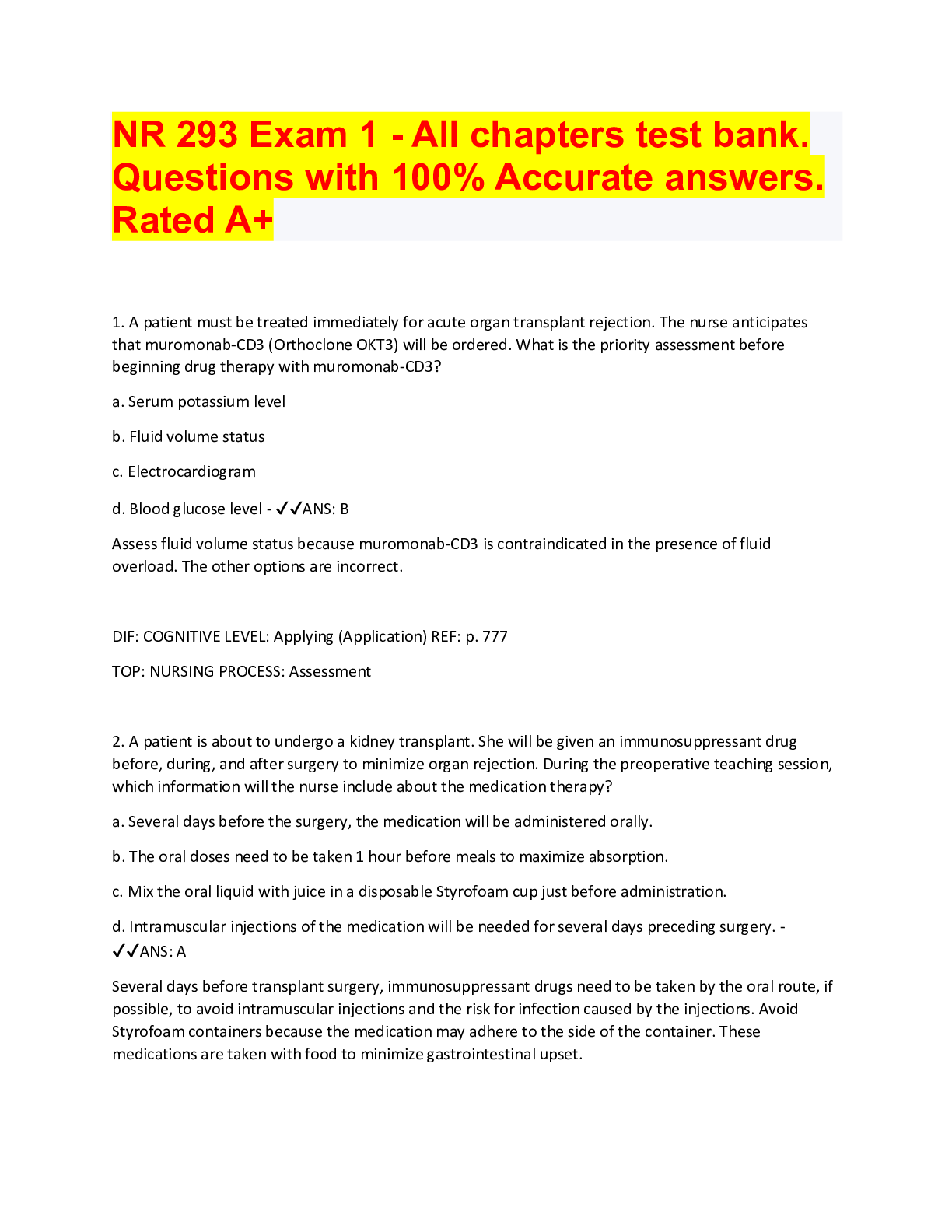
Also available in bundle (1)

NR 222 EXAM BUNDLE, QUESTIONS WITH ACCURATE ANSWERS, EXAMINABLE
COMPRISES OF ALL SETS OF NR 222 EXAM QUESTIONS WITH ACCURATE ANSWERS, ALL YOU NEED TO NR EXAMS
By bundleHub Solution guider 1 year ago
$29
21
Reviews( 0 )
Document information
Connected school, study & course
About the document
Uploaded On
Aug 12, 2022
Number of pages
63
Written in
Additional information
This document has been written for:
Uploaded
Aug 12, 2022
Downloads
0
Views
129

